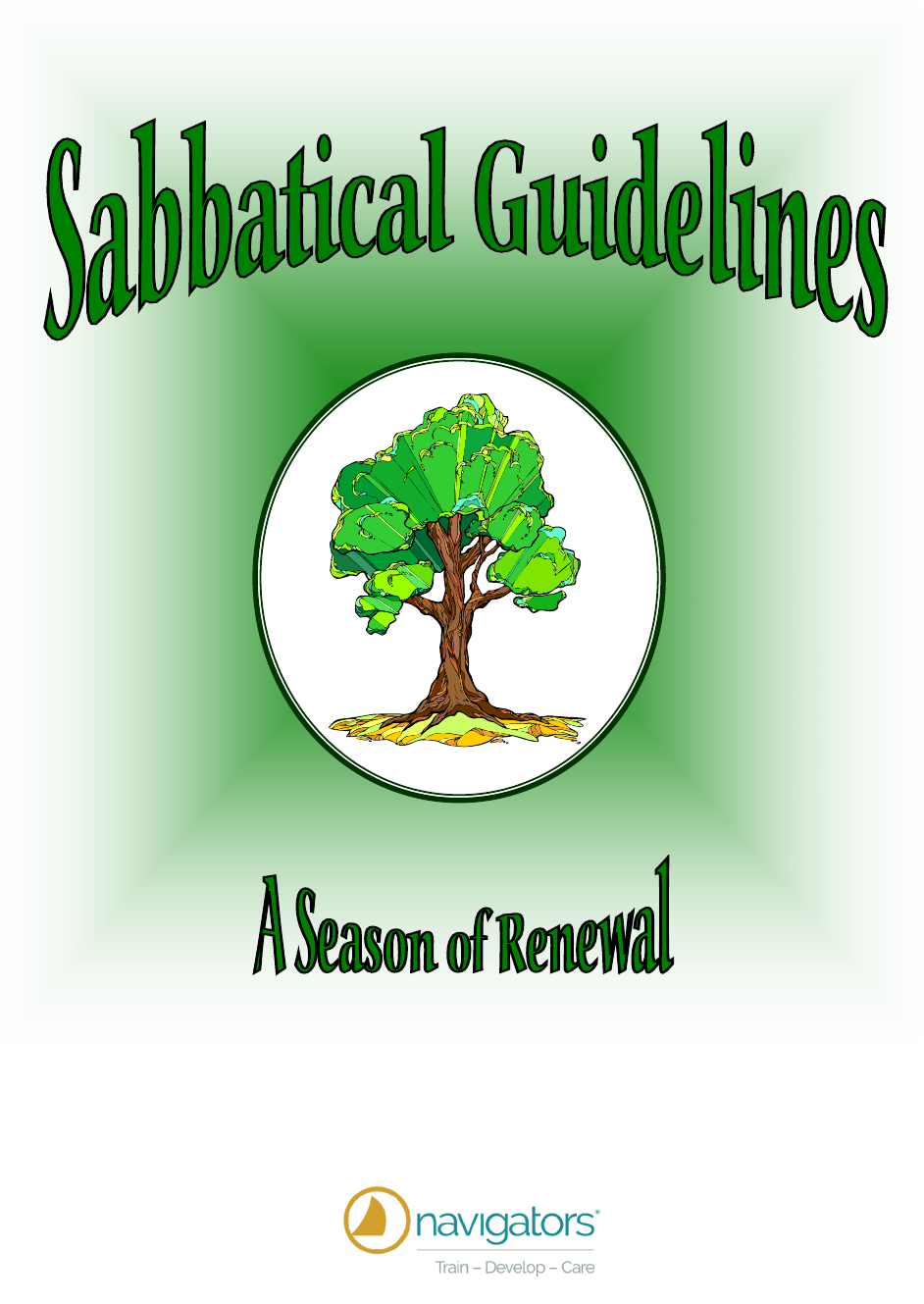
Freedom to Renew
Your Way
Revised January 7, 2022

Sabbatical
Guidelines
P.O. Box 6000 Colorado Springs, CO 80934
Any reproduction or changes of this material must have the written permission of The Navigators Train – Develop – Care Dept.
All rights are reserved for The Navigators. © 2001.
Revision – January 7, 2022

I
Dear Navigator,
STOP!
Does the sheer size of this document make you feel tired?
You’re holding in your hands a copy of The Navigators’ Sabbatical Process, which over the last ten
years has been shaped by hundreds of Nav staff who experienced life-changing sabbaticals. We’re
aware that if you think it might be time for a sabbatical, you’re probably already tired.
Instead of saying joyfully, “Oh, how nice of these people to send me all this information!” you’re
likely leaning more toward, “Do I have to read the whole thing?”
We created these suggestions to give you both the big picture and some details as you consider a
sabbatical. If you like knowing details up front, feel free to go all the way to the appendix. If you
just want an idea of what taking a sabbatical could mean for you, you might want to read through
page 12 and then browse until you’ve seen enough.
Feel free to renew in your own way. No two sabbaticals will look exactly alike. The guidelines in
this document are up for grabs, according to each person’s needs. The “what” and “why” of taking
a sabbatical stand on a solid foundation of truth; the “how” has a great deal of flexibility.
If you’re considering a sabbatical, here’s a good way to get started:
1.
Discuss your desires with your supervisor so you’re both on the same page.
2.
Call or contact me or the TDC office so we can get you well launched for your
sabbatical.
May God continue to bless and guide you as you consider this wonderful opportunity.
Magnificently marked by my Master,
Jim Lee
Director of Care Initiatives and Staff Sabbaticals
Train – Develop – Care (TDC)
719-594-2242
Sabbatical
Guidelines
July 28, 2020

II
I. Letters of Introduction 1
To Those Starting Sabbatical 1
To Sabbatical Advisors 2
II. Overview 3
Definition of a Sabbatical 3
What Will You Do During Your Sabbatical? 4
Getting Started 4
Selection of Sabbatical Advisor 6
Sabbatical Care Interview 6
Sabbatical Support Group 6
Guidelines for Sabbatical Support Group Members 8
Marriage Intimacy Retreat 9
Sabbatical Orientation Workshop 9
A Word to Spouses 10
Reassignment Process 10
Spiritual Transformation 10
Personal Contribution Assessment 11
Sabbatical Expense Guidelines 12
Resources 13
Helpful Tips and Lessons Learned 17
Sabbatical
Guidelines
Table of Contents

III
III. Details for Sabbatical Phases 18
Phase I - Release and Relinquish 18
Exiting from leadership roles and ministry responsibilities
Phase II - Rest and Recovery 20
Establishing margin & managing pace of life
Phase III - Reflect and Refocus 22
Experiencing God and self in new or deeper ways
Phase IV - Realignment and/or Reassignment 24
Empowering for maximum contribution
Sabbatical Debriefing Questions 25
Phase V – Re-Entry and Re-Engagement 26
Engaging at right pace
Sabbatical Process Checklist 27
Sabbatical Initiation 27
Sabbatical Time Overview 28
Post-Sabbatical 30
Follow-up 30
Appendix
Appendix A
Communicating about a Sabbatical
31
Appendix B Talking Points: Difference between Vacation &
Sabbatical
32
Appendix C Will People Give to Me When I Go on Sabbatical? 33
Appendix D Rest for the Weary 45
Appendix E Sample Sabbatical Plan 48
Appendix F Sabbatical Information Form 52
Appendix G Inventories: Role Fit; Burnout; Personal and Marital 53
Appendix H Sabbatical Care Interview Process 62
Sabbatical
Guidelines
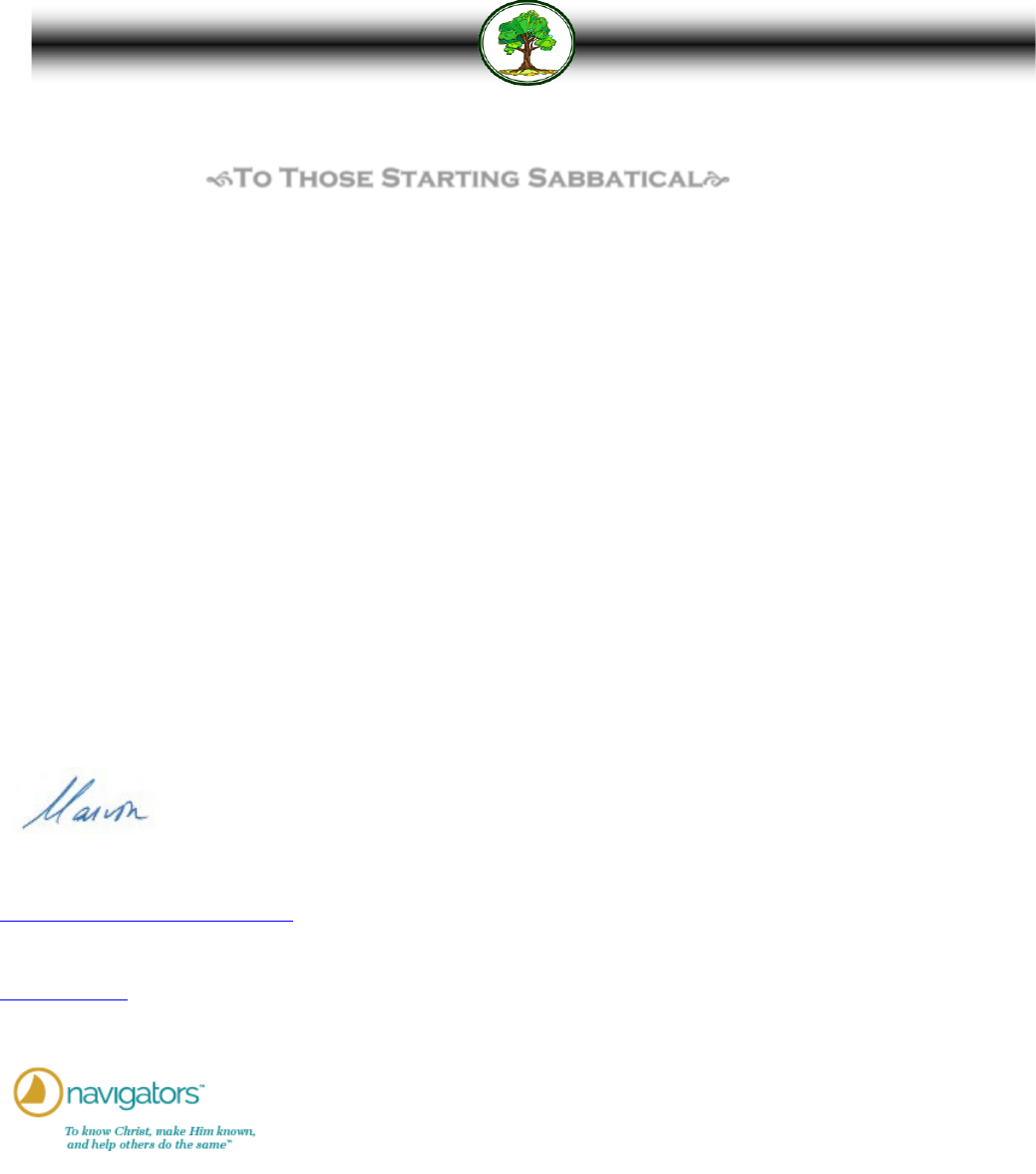
1
I. Letters of Introduction
January 6, 2022
Dear Staff:
If you’re reading this, you’re probably considering a sabbatical. Let me encourage you in your
decision. We’re committed to practicing and promoting development at every level in the
Navigators, and we believe that you, our field staff, are our greatest resource. Taking a 3-6-month
sabbatical every 7-10 years is an important aspect of staff development.
Your decision to set aside time from your normal ministry responsibilities, to rest, reflect and
realign with God’s calling on your life, is a significant one that will pay you dividends for years to
come.
I want you to know that not only do you have our permission to take the time to experience this
sabbatical process, we greatly encourage it as you refuel and re-enter ministry. Also, if you’re
married, there is a great benefit in including your spouse as much as possible in this process.
Although you will be disconnected from ministry responsibilities for a season, you are still a valued
part of our Navigator community, and we would love to serve you in any way that we can.
May God bless and encourage you during this important time.
Marvin Campbell
U.S. Director
marvin.campbell@navigators.org
719-594-2385 (Office)
719-757-8008 (Cell)
navigators.org
Sabbatical
Guidelines
To Those Starting Sabbatical

2
July 28, 2020
Dear Sabbatical Advisor:
A sabbatical is a unique and powerful opportunity to hear from God, but potential “downsides”
do exist. During sabbatical, people have experienced discouragement, loneliness, isolation, and
loss of perspective. A significant part of the solution is a friend…a spiritual friend. That’s a good
way to describe a sabbatical advisor. The sabbatical advisor doesn’t do much teaching. He
doesn’t do much directing. He takes the initiative to come alongside and listen, clarify, suggest,
and possibly protect. A sabbatical advisor shepherds the staff through the sabbatical process,
helping them achieve their God-directed goals.
The following pages will guide you in being the best possible friend to the staff on sabbatical. If
you’ll apply the process described in these guidelines and make sure the checklist for each
phase is completed, you’ll make a significant contribution into the life of another. Successes
and lessons learned from many staff who’ve experienced a sabbatical have shaped these
guidelines. When they’re faithfully applied, staff return to ministry with renewed excitement,
creativity, and passion.
Not long ago one of our advisors was helping a staff couple prepare for their sabbatical. As
they discussed priority needs and action steps to meet these needs, the advisor noticed tears
in the husband’s eyes. He stopped and asked if everything was okay. The man paused and
then replied, “Yes, I’m fine…it’s just that someone cares.”
Thank you for being someone who cares!
If you run into problems or find something confusing, please contact me. If you have ideas to
make this process better, please let us know. We welcome suggestions from a friend.
Together for His glory,
Jim Lee
Director of Care Initiatives and Staff Sabbaticals
Train – Develop – Care (TDC)
719-594-2242
Sabbatical
Guidelines
To Sabbatical Advisors

3
II. Overview
The U.S. National Leadership Team made a decision in 1998 to strongly encourage every
Navigator staff to take a 3-6 month sabbatical every 7-10 years. This sabbatical process is a
result of that decision.
Corporately – The U.S. Navigators want our staff to plan for a sabbatical every 7-10 years.
Although this is counter to our culture, we think it will pay weighty dividends to the individual
and to the Kingdom of God.
Practically – In the ministry, the messenger is the message. The messenger must embody the
message. When that is no longer true, it could be time to consider a sabbatical.
Biblically – Taking a sabbatical is an application of the biblical principle of rest - times we
deliberately trust God with the unfinished. As an act of faith, we disengage from our regular
work for the purpose of worship, rest, renewal, and repair.
Here are some great times to consider a sabbatical:
-
When you’re facing or considering a transition in life or ministry.
-
When you’re struggling with burnout or resenting your calling.
-
If you haven’t had a sabbatical in the last 7-10 years.
When we use the word “sabbatical,” we’re not talking about a vacation but a guided process
where we deliberately trust God for the unfinished as we disengage from normal ministry and
leadership involvement to allow for serious evaluation of life and ministry. Eugene
Peterson’s paraphrase of Matthew 11:28-30 in The Message captures this thought:
Are you tired? Worn out? Burned out on religion? Come to me. Get away with me and
you’ll recover your life. I’ll show you how to take a real rest. Walk with me and work
with me—watch how I do it. Learn the unforced rhythms of grace. I won’t lay anything
heavy or ill-fitting on you. Keep company with me and you’ll learn to live freely and
lightly.
This is a time to quiet the noise of life and hear the voice of Jesus.
Sabbatical
Guidelines
Why take a sabbatical?
When to take a sabbatical?
Definition of a Sabbatical

4
1.
Release and Relinquish – During this first phase you disengage from the ministry and
leadership responsibilities, and you establish a plan for your sabbatical. This sabbatical plan
is an initial framework for direction and reflects priority needs.
2.
Rest and Recovery – “Rest” in the second phase of the sabbatical doesn’t mean ceasing
from all activity. Rather, you stop ministry activities and, where possible, other areas of
stress. You consider what restores you emotionally and feeds you spiritually. During this
phase, be sensitive to feelings of isolation or lack of significance. You should be out of
regularly scheduled ministry activity but not out of fellowship. At the end of this phase
the Ken Larson ([email protected]) will be in contact with you and your
supervisor, if you are desiring a change of mission.
3.
Reflect and Refocus – During this phase, you should be asking the question, “Lord, is there
anything You want to say to me?” Consider how God has spoken to you in the past and
posture yourself to hear His voice. Scheduling extended time alone with God is a priority.
4.
Realignment and/or Reassignment – “Father, what changes in life and ministry would you
like me to make as a result of hearing from You?” This doesn’t necessarily imply a change of
roles but be willing to hold your current ministry in an open, surrendered hand. During this
phase of the sabbatical, it’s important to review and reaffirm your calling. The goal is to
experience maximum contribution in this next season of life, which may or may not mean
changing jobs.
5.
Re-Entry/Re-Engagement – In this phase you transition back into ministry. Expect
emotional stresses, pace issues, spiritual warfare, and struggles in working out desired
changes in life and ministry. Also expect the joy of being refreshed physically, reaffirming
His vision for you, and gaining renewed perspective!
A sabbatical may be initiated by you, by a supervisor, or at the suggestion of someone from
Train – Develop – Care. (TDC). TDC will send a copy of Sabbatical Guidelines to interested
parties.
Our vision is for sabbaticals to become a normal aspect of every Navigator career. The timing
should be set according to your ministry/family needs and in consultation with your supervisor.
A typical sabbatical is 3-6 months. You, your supervisor, and your sabbatical advisor should
agree on the length. (This can later be extended, if necessary.) Any extensions should be
coordinated with current supervisor and sabbatical advisor.
When you and your supervisor have agreed on your taking a sabbatical, the Sabbatical Director
(SD), should be notified so you can get plugged into the process, a sabbatical advisor can be
chosen, and your sabbatical will be well launched.
Sabbatical
Guidelines
Getting Started
What will you do during your Sabbatical?
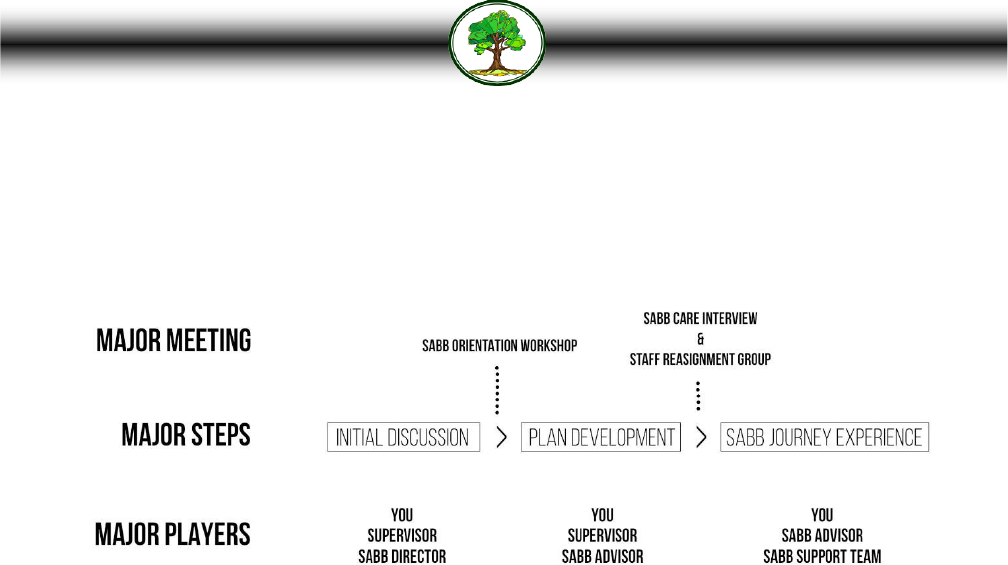
5
Who are the primary players in your sabbatical experience?
-
During the Initial Discussion of your sabbatical, you should talk with your supervisor, family,
team, and the Sabbatical Director to determine the timing of your sabbatical.
-
During the Plan Development for your sabbatical, your supervisor and your sabbatical advisor
should help you identify direction and focus for your sabbatical.
-
During your Sabbatical Journey, you should be interacting with your sabbatical advisor and
your sabbatical support team for feedback and community.
I can state without wavering that the single greatest need of the church today is the restoration of
ministers. What is required is a quite different approach to their life and work. It is a matter of
leading them into a massive shift of the dynamics of their personality under God, and one that
cannot be done by more books and conferences. They need to be taken out of the circulation for a
sufficiently long time to re-vision and re-structure their lives in communion with Jesus and his
kingdom.
- Endorsement by Dallas Willard on back of brochure for Hilltop Renewal Center, Brea, CA
-
During the Realignment/Reassignment phase of your sabbatical you should be interacting with
your Supervisor, Sabbatical Advisor and your Sabbatical Support Team, as you consider your
design, your role fit, and your options. If you desire to change missions, you should also be
interacting with the Ken Larson ([email protected])
Sabbatical
Guidelines
Primary Players

6
The choice of a sabbatical advisor is a collaborative effort between you, your supervisor, and
the Sabbatical Director. Where possible, a sabbatical advisor is selected from staff who:
• Have completed a sabbatical.
• Live in the same geographic region.
• Understand the critical role of a sabbatical advisor.
• Are willing to take the initiative and commit the time necessary to serve.
The role of a sabbatical advisor is to shepherd you through the sabbatical process. Staff from
TDC are available to train and mentor sabbatical advisors.
When your sabbatical is confirmed, the Sabbatical Director (SD) should be notified so a
sabbatical care interview can be set up with a pastoral care specialist. Just as you take an
annual physical to check your body, the beginning of sabbatical is a great time for a spiritual
and emotional checkup. The pastoral care specialist will meet with you and, where applicable,
with your spouse. The interview takes 2-4 hours per person. Before your sabbatical care
interview, you (and your spouse) should complete and turn in the following inventories:
• Appendix G – Role Fit Inventory, Burnout Inventory, Personal and Marital Survey.
Email to TDC@navigators.org.
• Appendix F – Sabbatical Information Form (SIF). Email to TDC@navigators.org.
The inventories and survey are kept confidential and seen only by the pastoral care specialist.
The interview will result in suggested “priority needs” (typically 2-4) and a list of possible
resources to help meet those needs. Your pastoral care specialist will give you a copy of these
suggestions. You should discuss these with your sabbatical advisor so the issues and possible
action steps can be incorporated into the sabbatical plan (see Appendix E). The Sabbatical
Information Form will be shared with Ken Larson (ken.larson@navigators.org).
Anyone taking a sabbatical is in danger of experiencing lack of community, loss of perspective,
and a sense of isolation. While we all need times alone, we live and minister in community. To
meet this need for community, everyone on sabbatical is encouraged to establish a sabbatical
support group.
Ideally, this group consists of 3-5 couples for married staff or 3-5 people for singles (both
Navigator and non-Navigator where possible) who have a good relationship with you. This group
meets with you (and your spouse) each month to help process your journey in a safe
environment. You facilitate the meetings, sharing first your current progress and then asking for
Sabbatical
Guidelines
Selection of Sabbatical Advisor
Sabbatical Care Interview
Sabbatical Support Group

7
input. (When possible, your sabbatical advisor will participate in the group.) Ideally, people in
the sabbatical support group should meet the following criteria:
• Have your best interest at heart.
• Willing to speak truth to you.
• People with whom you’re willing to be transparent and vulnerable.
(Transparent = open and honest about yourself. Vulnerable = invite others to speak into
your life.)
• Willing to meet monthly for the duration of the sabbatical.
IDEA
• Sabbatical Notebook: At your sabbatical kickoff event (lunch, dessert, etc...)
meeting with your sabbatical team, give them a notebook/journal and a pen so they
can record observations about you during the meetings and write down thoughts
they may have in-between meetings or group phone calls.
o Include a note on the first page that is something like this:
Sabbatical
Guidelines
Dear Phil,
Thank you for being willing to be a part of our sabbatical team. We really appreciate
it.
Please use this journal to record:
• Observations about us
• Questions you have
• Questions you want to ask us
• Team calls to discuss where we are in the process
• Etc…
Thank you once again for entering into this journey with us. Your investment of
time into our lives means so much to us!
Sincerely,
Joe

8
Thanks for serving the staff on sabbatical! Here are some guidelines to help define your role as a
member of the sabbatical support group:
1.
Provide community for the staff on sabbatical and help offset isolation.
a.
Gen 2:25 – Help them be fully known and fully accepted.
b.
Phil 2:20 – Help them feel cared for and understood.
2.
Keep their best interest at heart.
3.
Speak truth to them.
4.
Meet monthly with them as a group.
• Beware of canceling an SSG meeting because a few people will be absent.
5.
Help them work through their sabbatical plan.
6.
Expect and encourage them to be transparent and vulnerable with you.
7.
Pray regularly for them.
Illustration of your role:
1.
Speak to the timing of moving from one phase to the next. You may see a need to
extend or change a phase.
2.
Speak to issues they’re working through.
Sample Agenda for First Meeting (2 hours)
Sample Agenda for Future Meetings (2 hours)
1. You lead the meeting.
2. Each person introduces himself.
3. Staff shares sabbatical plan
and expectations for SSG.
4. Question-and-answer time.
5. Schedule next few SSG meetings.
6. Close in prayer.
1. You lead the meeting.
2. Give an update and bring up any issues.
3. Give SSG opportunity to express
their thoughts.
4. Spend some time in prayer.
5. Have refreshments and a time
of fellowship
Sabbatical
Guidelines
Guidelines for Sabbatical Support Group Members
Guidelines

9
People in ministry often become so involved in giving to others that their personal lives are
neglected. They focus on the biblical principal found in Matthew 10:8, Freely you have received,
freely give, but may not experience another principle from Galatians 6:6 – Anyone who receives
instruction in the word must share all good things with him who teaches.
Train – Develop – Care (TDC) sponsors Navigator staff couples on sabbatical to attend a two-day
Becoming One Retreat in Colorado Springs or a Galatians 6:6 Intimacy Retreat. This retreat,
designed to help couples better understand and meet each other’s emotional intimacy needs, is a
time of personal renewal and encouragement exclusively for ministry couples. It’s a time to freely
receive and to be reminded that the Great Commandment to love others begins at home. (TDC
pays the fee for the retreat; transportation cost is your responsibility.)
Contact [email protected] to register for the Becoming One Retreat, offered twice per year (see
the current dates in the events section on TDC.Navigators.org). For the latest schedule of the Gal
6:6 Retreats, contact www.greatcommandment.net.
To help you make the most of your sabbatical, TDC conducts a three-and-a-half-day workshop
every February and July for those starting a sabbatical, their spouses, and their sabbatical
advisors. Plan to come 3 – 18 months before your sabbatical starts. The retreat includes
instruction and discussion in the following areas:
• Calling: the simple but profound process of clarifying God’s direction for you.
• Healing Prayer: allowing God to heal our wounds and speak truth into lies we’ve learned to
believe about life.
• Establishing a Sabbatical Support Group: how to benefit from this lifeline of friends who
will help keep you on track.
• Developing Your Sabbatical Plan: those who report a positive sabbatical also report having
begun with an accurate assessment of priority needs and a realistic sabbatical plan.
• Learning God’s Lessons from Life Experiences: crystallizing life experiences into life lessons
that will instruct and motivate you in life and ministry. (More time is devoted to this in
Reflection Phase of your sabbatical)
• Personal Contribution Assessment Process: discovering the importance of understanding,
developing and employing your God-given design and desires.
• Soul Care: practical suggestions for nurturing your soul.
Cost of the workshop is $120 per person. This covers the cost of materials, breaks, and lunches.
Spouses are strongly encouraged to attend together. Contact TDC@navigators.org for the latest
schedule.
A veteran staff of 30 years described his Sabbatical Orientation Workshop as “…the most intimate,
personal, refreshing experience with God and other staff I have ever had in The Navs.”
Sabbatical
Guidelines
Becoming One Retreat
Sabbatical Orientation Workshop

10
“When do I get my sabbatical?” is a sentiment often expressed by spouses of staff on
sabbatical. This is especially true for a wife whose main ministry is mothering and maintaining a
household. Her work continues and may even increase when her husband is at home. Her
opportunity to rest, reflect, and refocus is often limited. (See Appendix D)
When putting together the sabbatical plan, a sabbatical advisor should acknowledge the
spouse’s workload, encourage husband and wife to examine parental and household
responsibilities, and consider how the load can be lifted or shared during this sabbatical so
both can participate as much as possible.
The reassignment process helps staff find a good ministry fit. Reassignment should meet the
strategic directions and priority needs of the U.S. Navigators, as well as the staff’s design and
desires. Ken Larson ([email protected]) oversees this process. The policy, process, and
flow chart are in Appendix I.
Spiritual transformation is a major focus during sabbatical. Experiencing inner freedom and
more Christ-like character occurs as we allow the Holy Spirit, the Word, and others to speak
to our inner person.
Surely you desire truth in the inner parts; you teach me wisdom in the inmost parts.
(Ps 51:6)
The heart of the discerning acquires knowledge; the ears of the wise seek it out.
(Proverbs 18:15)
Spiritual growth does not occur by changing our behavior, but by changing what we believe.
Dallas Willard
As we come to understand what we believe about God, the world, ourselves, and others, and
as we allow Jesus to touch those beliefs, we become more transformed into the image of God
and experience more of the freedom of the Gospel.
The Reflection Phase is a good time to look at issues like lack of brokenness, false identity,
unresolved sin and woundedness, addictions, performance, perfectionism, hiddenness, shame,
fears, guilt, pride, anger, etc. Dealing with these below-the-line issues in our lives helps us
move from living from the heart of flesh to living from the heart Jesus gave us. Let us know
how we can help you!
Sabbatical
Guidelines
A Word to Spouses
Reassignment Process
Spiritual Transformation

11
Sabbatical
Guidelines
Personal Contribution Assessment
Make a careful exploration of who you are and the work you have
been given, and then sink yourself into that. Don’t be impressed with
yourself. Don’t compare yourself with others. Each of you must take
responsibility for doing the creative best you can with your own life.
Galatians 6:4-5 (The Message)
Overview
Inward
Backward
Outward
Forward
Upward
of the Journey
ADDRESSES
THE QUESTION:
How has God
designed me?
How has God
worked in the past?
How has God
motivated me?
How is God directing
me?
How is God speaking
through the process?
TOPICS:
Preferences
Personal Values
Spiritual Gifts
StrengthsFinder
Memorial Stones
Global Concerns
Ministry Values
Community
People
Bucket List/Verses
Life purpose/Vision
Directed time alone
With God
RESULTS:
Summary of Inward
Summary of themes
or life lessons
Summary of
God-given burdens
or concerns
Summary of your
Vision Statement
Seeking God to
guide and direct
It is recommended that you attend this workshop/process during the Reflection Phase of
your sabbatical to engage in discovering your God-given design and defining the contribution
God would have you make in the next chapter of your life. Workshops are scheduled in
Colorado Springs. Contact: TDC@navigators.org for more information.

12
Rev 11/08
General Principle: Only ministry-related expenses will be allowed during a sabbatical. Some
sabbatical expenses (meals, recreation, etc.) are personal expenses. For tax purposes, a
sabbatical is a leave of absence with pay and is a self-defined benefit in and of itself.
General Guidelines
1.
You may raise extra ministry funds to meet additional ministry expenses expected
during your sabbatical. Extra salary may be raised/approved to cover additional
sabbatical expenses that are not ministry-reimbursable. Such funds are taxable
compensation and must be approved by a ministry leader.
2.
Expenses for rest, relaxation, and recreation are considered personal and not ministry.
3.
Going someplace local alone is a personal expense (a movie, a local coffee shop
for prayer/reading/reflection).
4.
Expenses when you and/or your spouse travel overnight for a prayer/reflection retreat
are ministry expenses.
5.
Expenses for meals alone are allowed only when you’re away from home overnight
on ministry business. (Meal - Travel).
6.
When reporting sabbatical ministry expenses on Workday, fill in “Memo” with the
“why” of the expense (spiritual/prayer retreat, met with sabbatical support group,
professional development, etc.). In the Comments section, include a comment about
how this relates to your sabbatical (part of approved sabbatical plan, approved by ,
went by myself, also spent 2 nights doing , etc.).
Examples of Reimbursable Sabbatical Ministry Expenses
1.
Counseling for ministry- related issues
2.
Overnight prayer retreats
3.
Professional development books/seminars/courses
4.
Sabbatical support group meetings
5.
Sabbatical Orientation Workshop
6.
Becoming One Retreat or Galatians 6:6 Retreat
7.
Personal Contribution Assessment Workshop
8.
Meeting with sabbatical advisor or supervisor
If you aren’t sure whether something is a reimbursable sabbatical ministry expense, please
contact [email protected].
.
Sabbatical
Guidelines
Sabbatical Expense Guidelines

13
Sabbatical Guidelines
Resources
BOOKS
Biblical Foundations
Buy a Cabin, by Robert L. Franck
Emotionally Healthy Spirituality, by Peter Scazzero
Sabbath Keeping, by Lynne M. Baab
Listening Prayer
Listening Prayer Workbook
God Guides
Can You Hear Me, by Brad Jersak
Sabbatical Planning
Sabbatical Guidelines, The Navigators
Isolation, by Shelley Trebesch
The Overload Syndrome, by Richard A. Swenson
The Rest of God: Restoring Your Soul by Restoring Sabbath, by Mark Buchanan
Community
Experiencing the Trinity, by Darrell W. Johnson
Overcoming the Five Dysfunctions of a Team, by Patrick Lencioni The
Safest Place on Earth, by Larry Crabb
The Cure, by Bill Thrall
Life Lessons
Windows of the Soul, by Ken Gire
Healing Prayer
Healing Prayer Guidebook
A Guide for Listening and Inner Healing Prayer, by Rusty Rustenbach
Life of the Beloved: Spiritual Living in a Secular World, by Henri J. Nouwen Living
from the Heart Jesus Gave You, by James Friesen, et al
Soul Care
Embracing Soul Care, by Stephen W. Smith
Soul Keeping, by John Ortberg Abba’s Child,
byBrennan Manning
Intimacy with the Almighty, by Charles Swindoll
Personal Contribution Assessment
It’s Your Call, by Gary Barkalow
Let Your Life Speak: Listening for the Voice of Vocation, by Parker J. Palmer Personal
Contribution Assessment Workbook
Prayer & Temperament, by Chester Michael & Marie Norrisey

14
RETREAT CENTERS
Some places are free, inexpensive, for donation, or programs with a counseling fee. Items marked with “**”
indicate programs which include intensive counseling.
Notes:
• If you visit one of these places, please give us your feedback on the accommodations and suitability for
personal retreats. And if you know of other retreat gems, let us know!
• This information has been compiled by word of mouth; therefore, some information may be out of date. We
appreciate any updates if you use this resource. Thanks!
ARIZONA
**Tucson: Arizona Center for Hope and Transformation, John and Patti Cepin, 520-795-8960
CALIFORNIA
Pasadena: Providence Mission Homes, https://providencemissionhomes.com/,
Providencehomes1@yahoo.com, John Pentecost (Executive Director): (626) 840-7219
**San Jose: Pastoral Care School, www.pastoralcareschool.org, info@pastoralcareschool.org, 408-280-1021
COLORADO
Arvada: Vacare Dea, daswanson@comcast.net
Beulah: Easy Yoke Ranch, retreathood.com/retreat/easy-yoke-retreat-house, 719-485-4800
Buena Vista: Trail West, Young Life, www.trailwest.yl.org, 719-395-2477
Spring Canyon Conf. Center (Officers Christian Fellowship), www.springcanyon.org, 888-663-1417
**Cimarron: Sonrise Mountain Ranch, www.sonrisemountainranch.org, 970- 249-5774
Colorado Springs: Hospitality ministry, remodeled home overlooking the mountains, Erv Bontrager,
ebontrag@comcast.net, 719-465-1521
Franciscan Retreat Center, www.franciscanretreatcenter.org, 719-955- 7025
Glen Eyrie, www.gleneyrie.org, 719-265-7050
Shelter Ministries, www.shelterpines.org, contact@shelterpines.org, 719-522-1487
Divide: Above All Else, https://www.aaelse.com/, Offers soul care retreats as well as cabins to rent for personal
get-aways
Rocky Mountain Mennonite Camp, http://www.rmmc.org/; 719-687-9506
Elk Meadow Ranch, elkmeadowr[email protected], 402-440-5984, for those in full-time Christian ministry.
Minimum 3nights stay required. Maximum 7 nights. Only charge is a cleaning fee.
Durango: Rocky Mountain Renewal, info@rockymountainrenewal.org, 970-259-7778
Estes Park: YMCA, ymcarockies.org, 970-586-3341
Elizabeth: Unbridled Acts, www.unbridledacts.org, 800-646-3138 (Doud House)
Florissant: Christ Haven Lodge, admin@christhaven.net, 719-687-3425 or 866-878-6483
The Son’s Place, Watkins@theSonsplace.org, 719-748-1150
Praise Mountain, www.praisemountain.org, 719-748-3719
Glenwood Springs: Operation Vacation, www.operationvacation.org – free to military personnel
Lake George: Rock River Retreat, Contact Doug Lagasse by texting or email: 719-659-7911
TheRockRiverRetreat@gmail.com
Larkspur: SonShine Ranch & Guest Home, www.sonshineranchguesthome.com, contact:
info@SonShineRanchGuestHome.com, 303-685-2505.
**Marble: Marble Retreat Center, www.marbleretreat.org, ministrycare@marbleretreat.org, 888-216-2725
Monument: The Haven, daily donation $25, 5 bedroom, designed for couples and families,
[email protected]m, (931) 261-8428.
Sabbatical
Guidelines

15
Nathrop: Mount Princeton Hot Springs, www.mtprinceton.com, 888-395-7799
Ouray: Eagles Nest Ministries, http://eaglesnestrm.com/, 719-351-8959
Sedalia: Sacred Heart Jesuit Retreat House, www.sacredheartretreat.org, 866-930-1181, x122. Offers guided or
self-directed solitude and silence retreats. Private rooms with common bathrooms on each floor/wing. Highly
recommended.
Snowmass: St. Benedict’s, retreat@rof.net, 970-927-1162
Westcliffe: Living Water Ranch, 719-783-2485
Sky Ranch Horn Creek Conference Center, https://skyranch.org/pages/horn-creek-colorado, 719-783-2205.
Very nice, spacious, and affordable with amazing mountain views, including hiking trails, winter and summer
activities, a fitness center and hot tub
FLORIDA
Brandenton Beach: Beside Still Waters, www.beside-stillwaters.org, 877-608-0999 – Free
St. Petersburg: D&D Missionary Homes, www.DDMissionaryHomes.com, contact: Jerry Trask:
jtrask@DDMissionary.com, 727-522-0524.
HAWAII
Maui: Brewsters Rest Haven, contact Karen Meyer: Snail mail only. Contact address Oct-April: Brewsters Rest
Haven, 3139 Makamae Place, Kihei, Maui, Hawaii 96753, Contact address May-Sept: P. O. Box 92226, Anchorage,
AK 99509
IDAHO
Salmon River: Allison Ranch, June-Sept.: www.replace.com/allison, 208-377-3005
Garden Valley: Ebenezer Lodge, Contact Paul & Faye Spence: 208-462-5437 or [email protected]
ILLINOIS
Elizabeth: Triple Creek Ranch, gneece1@juno.com, 815-858-2435
KANSAS
Sharon Springs: Mt. Sunflower B&B, https://www.mtsunflowerbedandbreakfast.com/, 785-852-4004, free
for personal prayer retreat
MICHIGAN
**
Richland: Alongside, www.alongsidecares.net, info@alongsidecares.org, 269-671-4809
Upper Michigan (Huron City & Eagle): Elim Retreats: www.barnabas.org/elimretreats,
eliminquiry@barnabas.org, 815-395-1335, free
MINNESOTA
Cambridge: Lakeside Christian Church Prayer cabins, apartment on a lake in Minnesota,
www.chadashchay.com, lakeside@usfamily.net, 763-689-3649. (Also Prayer Cabins – Stay during the day or
overnight for a small suggested donation.)
MISSISSIPPI
Biloxi: Tux Creek Inn, http://tuxcreekinn.com/, [email protected]m, 228-324-3104
MISSOURI
Crossville (east of Knoxville): EdenRidge Retreat Center, www.edenridge.org/reservations, 931-783-1626. As of
7/1/13, an endowment fund will cover missionaries’ cabin rates for up to two weeks.
MONTANA
Fortine: Meadow Creek Retreat, Home available July-Sept.: Jerry & LuAnn
Broekhuis, lubroekhuis@fnwusers.com, 269-751-5706, must stay 5-7 nights
NEBRASKA
Sidney: www.prairieschoolretreat.com, donrcru[email protected], 308-249-5353
NEW MEXICO
Pecos: Pecos Benedictine Monastery, www.pecosmonastery.org, 505-757-6415
Sabbatical
Guidelines

16
NEW YORK
S
ilver Bay: Silver Bay YMCA - Brookside Community House and Trinity House, www.silverbay.org, 518-
543-8833, ext. 261, No fee for pastors and lay leaders involved in ministry. Available from Labor Day to early
June.
NORTH CAROLINA
Snow Camp: Siloam Homes, www.siloamhomes.org/about.htm, 877-914-3721
OHIO
Lewisburg: Innkeeper Ministries, www.innkeeperministries.org, bob@innkeeperministries.org
, 937-962-8312
PENNSYLVANIA
New Albany: The Haft, www.thehaft.org, [email protected]t
, 570-363-2189
Liverpool: Heartstream Resources: www.heartstreamresources.org, heartstream@compuserve.com, 717-444-2374
Manns Choice: White Sulpher Springs Conf. Center (Officers Christian Fellowship),
www.whitesulphursprings.org, 814-623-5583
TENNESSEE
Morristown: 1st Baptist Church of Morristown, The Prophet’s Chamber, close to Gatlinburg, TN, and Cherokee
Lake (NE of Knoxville, TN), 423-586-0522, 8am-5pm M-F - can stay for free 1 week
Knoxville: Lake House, goljim@covenanttransport.com,
423-240-5364
Roan Mountain: Fairhaven Ministries, www.fairhavenministries.net, info@fairhavenministries.net, 423-772-4269
TEXAS
Comfort: Haven River Inn, B&B on the Guadalupe River, 2 nights free to pastors and missionaries, for personal
or a group retreat, www.havenriverinn.com, haven@hctc.net,
888-995-7200
WASHINGTON
Usk: Cabin available, Bruce Rutherford: 509-445-1328, 792 Penny Lane, Usk, WA 99180
NATIONWIDE
Christian Hospitality Network: 700 B&Bs, www.christianhospitalitynetwork.org, info@christianlodging.org
, 865-
376-7546 - (Paul Cowell, Founder) free overnight to missionaries
Hospitality Homes: www.hospitalityhomes.org
Life Impact: The Oasis, AK, FL, KS, MI, MT, NY, OR, SD, www.lifeimpact.care
Servant Care: List of ministries, retreats, services to missionaries and pastors: www.servantcare.com,
servantcare1@gmail.com, 334-695-4043
Women of the Harvest: Retreats for women on furlough: www.womenoftheharvest.com,
retreats@womenoftheharvest.com – free
INTERNATIONAL
ARGENTINA, BRAZIL, CANADA, COSTA RICA: Life Impact Oregon: The Oasis;
www.lifeimpactoregon.org
, 541-593-7415
AUSTRIA: Barnabas Zentrum: Millstatt, provides a counseling retreat ministry for missionaries and pastors.
Retreats are in English and run for one and two weeks with a maximum of 8 persons. BZ desires to minister to those
who equip others both spiritually and emotionally: www.thebarnabasministries.org, barnabaszentrum@juno.com.
UNITED KINGDOM: Mission Encouragement Trust: Retreats for singles, officeMET@aol.com,
www.missionencouragementtrustuk.org.uk
ADDITIONAL RETREAT CENTERS: https://janjohnson.org/retreat-centers
Sabbatical
Guidelines

17
1.
If you have school-aged children, consider taking a sabbatical during the school year rather
than summer.
2.
Collegiate staff often begin sabbatical after spring break and finish in time to start the
following school year.
3.
It’s okay to sleep more.
4.
Don’t make any presumptions about your future ministry roles and involvements. God
may want you to let go of some things in order to take hold of other things.
5.
This is not a sabbatical from life. Expect to spend time on family responsibilities, Workday
expense reports, updating your supervisor, interacting with Ken Larson, etc.
6.
Expect to feel stress as you transition into the rest phase—change is stressful.
(Please forward to TDC any sabbatical resources, helpful tips, or lessons you’ve found helpful.
We’ll include them in future revisions of the Sabbatical Guidelines.)
Sabbatical
Guidelines
Helpful Tips and Lessons Learned

18
III. Sabbatical Phases
Exiting from leadership roles and ministry responsibilities
During this first phase, you disengage from ministry and leadership responsibilities, get needed
funding, and draw up a plan for your sabbatical. Typically, this phase starts 3-5 months before
the sabbatical begins. If possible, you, your spouse, and your sabbatical advisor should attend
a Sabbatical Orientation Workshop. (Contact TDC for the latest schedule.)
At the beginning of Phase I, your sabbatical advisor helps you and your spouse develop a
sabbatical plan. Begin by meeting with your supervisor to get his input. Your plan revolves
around priority needs identified by your supervisor, the sabbatical care interview, and the
following inventories:
Role Fit Inventory
Burnout Inventory (as needed)
Personal & Marital Survey
Sabbatical Information Form
Once you (and your spouse) identify your priority needs, your sabbatical advisor works with you
to come up with possible resources and action steps. You then create a sabbatical plan draft
that includes your funding plan, priority needs, action steps, and other resources. Your
sabbatical advisor and supervisor read the draft and give you input and suggestions.
The sabbatical plan is an initial framework for direction, based on your priority needs. It’s a
dynamic tool that can be tweaked throughout the sabbatical process. Early phases often have
more detail than later phases. A copy of the finalized sabbatical plan should be sent to your
supervisor, your sabbatical advisor, and the Sabbatical Director.
If you are desiring a change of mission, then the Sabbatical Information Form (Appendix F)
should be emailed to TDC@navigators.org.
Questions Sabbatical Advisors Should Ask During The Release And
Relinquish Phase:
1.
How are you feeling about disengaging from the ministry?
2.
Are you worried about losing financial support while on sabbatical? How’s your
funding? Have you contacted Staff Funding for help in coming up with a strategy for
funding your sabbatical?
3.
How have other staff and friends reacted when they learned about your sabbatical?
4.
How does your spouse (children?) feel about your sabbatical?
5.
Since drawing up your sabbatical plan a couple of weeks ago, have you had any further
thoughts? Do you still believe it reflects your priority needs and desires?
6.
What are your thoughts about returning to your role after sabbatical? Are you seeking
change?
Sabbatical
Guidelines
Sabbatical Phase I – Release and Relinquish

19
7.
Does the starting date for Phase II: Rest and Recovery still seem realistic to you?
8.
What excites you most about your sabbatical?
9.
What are your priorities for the next couple of weeks?
10.
What can I do to help you?
11.
What can I be praying for you?
Sabbatical Advisors Checklist: Release and Relinquish Phase
Staff has attended a Sabbatical Orientation Workshop in Colorado Springs.
Staff has communicated the sabbatical to donors/mailing list and current ministry
Staff has completed or shifted ministry and leadership responsibilities.
Sabbatical support group has been established.
Sabbatical Care Interview with individual (and spouse) has been completed.
Staff has requested input from his supervisor.
Sabbatical plan, based on priority needs, has been approved by supervisor.
Copy of the approved sabbatical plan has been sent to the supervisor, sabbatical
advisor, and Sabbatical Director
Staff, if applicable, has emailed copy of the Sabbatical Information Form
to TDC@navigators.org.
Sabbatical
Guidelines

20
Phase II – Rest and Recovery
Establishing Margin and Managing Pace of Life
It isn’t unusual for staff on sabbatical to have trouble letting go of the ministry. Some don’t
quite believe it’s really okay to step out. It’s important that you and your sabbatical advisor
make sure ministry commitments have been handed off or finished. During this phase, be
sensitive to feelings of isolation or lack of significance. Often, staff who are no longer “doing
ministry” struggle with their identity. You should be out of regularly scheduled Navigator
ministry but not out of fellowship.
It’s also common for staff to treat their sabbatical as another Type-A frenzied activity. As you
consider the inevitable ministry opportunities that will pop up during a sabbatical, the guiding
principle is, “Keep the sabbatical the focus.” Can you attend the meeting or prepare and
deliver the workshop without losing the focus of the sabbatical? “Extra opportunities” should
be examined individually and cautiously. Generally, we suggest you make a full break from
ministry activities.
“Rest” in this phase doesn’t mean ceasing from all activity. Rather, you pull back from ministry
activities and (where possible) other areas of stress. This gives you room to explore and
discover what relaxes you and what restores you emotionally.
TDC recommends the book, Isolation, A Place of Transformation in the Life of a Leader, by
Shelley Trebesch, to you and to your sabbatical advisor.
What Others Have Done During This Phase To Rest
Duck hunting Read novels Started fly-fishing Slept more
Played softball Gardened Home projects Travel
Questions Sabbatical Advisors Could Ask During This Phase
1.
How would you define or explain rest?
2.
Do you feel that you’re resting? What rests you?
3.
Are you experiencing any obstacles to rest?
4.
Have you noticed significant changes in your eating or sleeping habits?
5.
What things are stressful for you right now? Can anything be done to remove or
reduce them?
6.
How’s your relationship with your spouse? With your children?
7.
What are your thoughts about your last meeting with your sabbatical support group?
What kind of feedback are you getting from them? Do you think they understand
you?
8.
Is your sabbatical going the way you expected? How so?
9.
Have you given your supervisor an update recently?
10.
What are your priorities for the next two weeks?
11.
Is there something I can do to help you?
Sabbatical
Guidelines

21
Sabbatical Advisors Checklist: Rest and Relax Phase
Staff has pulled back from ministry and leadership responsibilities.
Action steps have been taken to promote rest.
Isolation has been read and discussed.
Sabbatical support group has met at least once each month.
Staff has contacted supervisor at least once with an update.
Staff has attended a Becoming One Retreat or a Galatians 6:6 Intimacy Retreat.
NOTE: These phases are based on a six-month sabbatical model.
Sabbatical
Guidelines

22
Experiencing God and Self in New or Deeper Ways
This is the work phase of the sabbatical. During this phase, you should be asking the question,
Lord, is there anything You want to say to me? God speaks to us in a variety of ways. You
should consider how God has spoken to you in the past and position yourself to hear His voice.
Extended time alone with God for reflection is the focus of this phase. This is the time to go
after whatever it is you want to pursue.
The concept of Learning God’s Lessons from Life Experiences is introduced during the
Sabbatical Orientation Workshop. This process should be completed during this phase.
What Other Staff Have Done During This Phase
• Extended times alone with God.
• Getaway to a retreat center.
• Completed the Personal Contribution Assessment Process.
• Developed a Partnering Plan – How will we team together is significant ministry outside
the home?
• Focused on Emotional Healing.
• Completed Learning God’s Lessons from Life Experiences.
• Read books of interest.
• Crystallized personal passions.
Questions Sabbatical Advisors Could Ask During This Phase
1.
Are you aware of anything that would hinder God from speaking to you during
this phase? (Busyness, unforgiving spirit, conflict, unconfessed sin, etc.)
2.
Is there anything I’ve missed that would be helpful to discuss?
3.
What things are currently stressful for you? Can anything be done to remove or
reduce them?
4.
How’s your relationship with your spouse/children?
5.
Tell me about your last meeting with your sabbatical support group. What kind of
feedback are you getting from them? Do you think they understand you? Are they
speaking into your life?
6.
Is your sabbatical going the way you expected? How so?
7.
When did you last give your supervisor an update?
8.
What are your priorities for the next two weeks?
9.
Is there something I can do to help you?
10.
Have you completed your Life Lessons? How can I help you get them completed?
11.
Is God stirring in you a new vision or desire to change missions? When will you contact
Sabbatical
Guidelines
Phase III – Reflect and Refocus

23
Sabbatical Advisor Checklist: Reflect & Refocus Phase
Completed Life Lessons.
Sabbatical support group has met at least once each month.
Staff has contacted supervisor at least once with an update.
Completed Personal Contribution Assessment Process.
Staff has crystallized his personal passions.
Staff has connected with ken.larson@navigators.org if envisioning a change of
mission.
Staff has developed a “Partnering Plan” (if married)
Sabbatical
Guidelines

24
At the beginning of this phase, it is IMPORTANT that you contact your supervisor and/or
mission leadership to learn their plans/desires for you after sabbatical. If you are anticipating
changing missions, Ken Larson (ken.larson@navigators.org) will serve as a liaison in
negotiating a job adjustment or change. TDC is also available to assist.
Don’t make any presumptions about your future ministry roles and involvements.
This is the application phase of the sabbatical. During this phase you want to answer the
question, “What changes in life and ministry should I make as result of hearing from God in
the Reflection Phase?” This might involve changing your ministry role; in that case, consider
going through the Staff Reassignment Process. Or you may want to change how you’ve been
handling your current ministry role – what realignments do you need to consider?
What Other Staff Have Done During This Phase
• Reviewed and reaffirmed their calling
• Updated their resume
• Received input from supervisor, sabbatical advisor, and TDC
• Interacted with Ken Larson (ken.larson@navigators.org)
• Received counsel from friends and staff
• Visited possible ministry locations
• Entertained options with various entities
• Completed Debriefing Questions
• Developed a plan for what to do differently in their role
Questions Sabbatical Advisors Could Ask During This Phase
1. With what you’ve learned in the last phases, do you see any adjustments you need to
make in your life or ministry to more accurately reflect your design and desires?
2. What do you sense God has for your future?
• Realignment?
• Reassignment?
3. If you lack clarity about the future, what specific steps might you take to see more clearly?
4. Can you describe your perfect job? Be sure to include elements or functions you
consider essential. Also pinpoint those that should NOT be your primary
responsibility.
5. Does your sabbatical support group think you’ve completed your sabbatical? Do they
affirm your job selection and job description?
Sabbatical Advisor Checklist: Realignment & Reassignment Phase
Staff has contacted supervisor and discussed their future role.
Staff has contacted Ken Larson, if necessary.
Met with sabbatical support group at least two times.
Staff and supervisors agree on Realignment or Reassignment.
Debriefing questions (page 25) were completed and discussed, and a copy sent to
supervisor, sabbatical advisor, and Sabbatical Director.
Sabbatical
Guidelines
Phase IV – Realignment and/or Reassignment
Empowering for Maximum Contribution

25
It’s very important for you to take time to reflect on the sabbatical and capture major lessons in
writing. After you complete the debriefing questions below, you’ll discuss them with your
sabbatical advisor and supervisor. A written copy of the completed questions should be sent to
your supervisor, sabbatical advisor, and the Sabbatical Director.
Personal Questions
1.
Are there some major words from God regarding you and/or your future?
2.
What is your final decision on your ministry assignment?
3.
What are the hopes and desires God has given you for your next contribution?
4.
What are some major lessons learned and what are you going to do differently in this
next chapter of life and ministry as a result of your sabbatical time and time with God?
5.
How would you rate your sabbatical from 1-10? (1 is low, 10 is high)
6.
Do you have any emotional healing or relational healing issues you want to work
on? What’s your next step?
Process Questions
1.
What activities were most helpful during each phase of your sabbatical?
2.
What activities were least helpful during each phase?
3.
What would you do differently?
4.
Would you consider being a sabbatical advisor to another staff?
5.
Do you have ideas, suggestions, or comments to help us improve the sabbatical process?
Sabbatical
Guidelines
Sabbatical Debriefing Questions

26
At the beginning of this phase, be aware that your pace of life will increase, and that transition
is stressful. Expect emotional disorientation and spiritual warfare as you re-engage.
What Other Staff Have Done During This Phase
• Resumed ministry responsibilities half time for the first month.
• Take 2-4 weeks to move from Sabbatical Pace to full time Ministry Pace.
• Set up accountability relationships to help with changes they want to make in
life and ministry.
• Coached ministry and teammates on their desired changes.
• Scheduled no major responsibilities for at least the first 4 months.
Questions Sabbatical Advisors Could Ask During This Phase
1. What changes have you experienced as you’ve re-engaged?
2. How can we help you as you re-enter ministry?
Sabbatical Advisor Checklist: Re-Entry & Re-Engagement Phase
Staff has communicated and worked out with their supervisor and team their desires
and expectations for re-entry.
Staff is maintaining a good pace.
Staff has continued involvement with Ken Larson (ken.larson@navigators.org), if necessary.
Sabbatical
Guidelines
Phase V – Re-Entry and Re-Engagement
Engaging at right pace
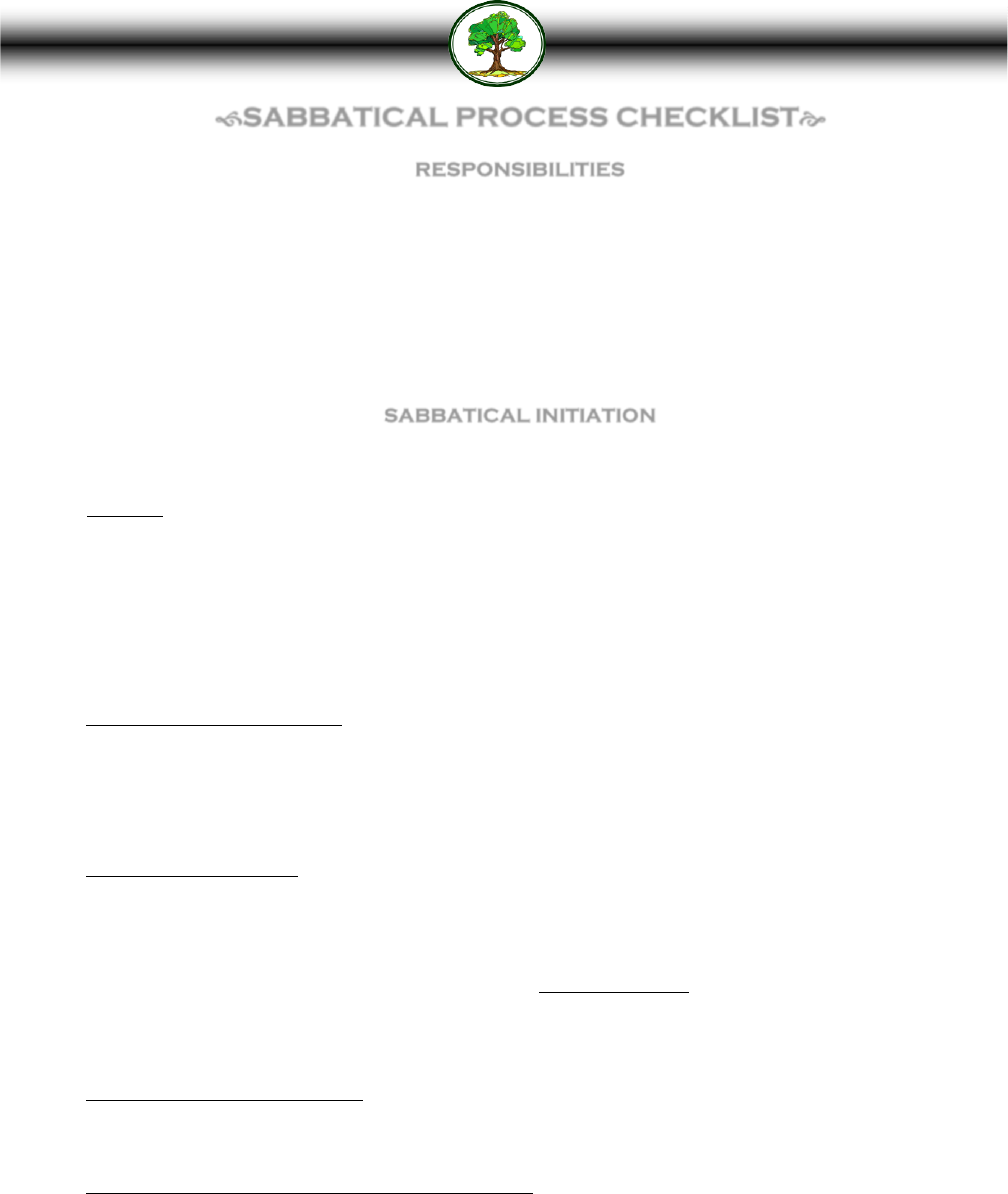
27
Sabbatical Guidelines
SABBATICAL PROCESS CHECKLIST
RESPONSIBILITIES
•
Staff and spouse – Give themselves to the sabbatical process and experience all God has for them.
•
Sabbatical Advisor (SA) – Shepherd staff through the sabbatical process.
•
Supervisor – Authorize the sabbatical and give feedback on issues,
•
Sabbatical Support Group (SSG) – Provide community for staff and help staff process issues in a safe
environment.
•
Sabbatical Director (SD) – Oversee and give strategic direction to the process.
•
Sabbatical Process Assistant (SPA) – Assist the SD.
•
Ken Larson (ken.lar[email protected]) – Guides staff through Reassignment Process.
SABBATICAL INITIATION
Things to think through as you consider a Sabbatical:
Initiation
Process can be initiated by staff, supervisor, or TDC.
Staff and supervisor view Sabbatical Guidelines on NavCentral.
Supervisor approves the sabbatical.
Staff or supervisor informs the SD of the impending sabbatical.
Staff begins thinking about who could be in their Sabbatical Support Group.
Staff and spouse consider how to maximize one another’s involvement in the sabbatical.
Selection of Sabbatical Advisor
Supervisor, staff, and SD determine who could be a Sabbatical Advisor (SA).
Staff links with the SA.
SA takes initiative to meet with staff to understand their situation and sabbatical timeframe, desires, and objectives.
Begin drafting Sabbatical Plan.
Sabbatical Care Interview
Director of Pastoral Care determines the best pastoral care specialist for the Sabbatical Care Interview.
Pastoral care specialist contacts staff to set up Sabbatical Care Interview.
Sabbatical Process Assistant (SPA) emails Sabbatical Questionnaires/Inventories to the staff.
Staff completes questionnaires and forwards answers to TDC@navigators.org.
Pastoral care specialist meets with staff, then prepares Sabbatical Care Interview Feedback, addressing
recommendations and identifying priority issues for staff individually or as a couple. Pastoral Care Specialist
distributes the report to staff and keeps a copy in a confidential file.
Sabbatical Orientation Workshop
Staff plans to attend a SOW during Release and Relinquish Phase.
SD adds the staff’s name to the SOW Invitation List.
Becoming One Retreat/Galatians 6:6 Intimacy Retreat
Staff contacts TDC for the schedule of Becoming One or Gal 6:6 Intimacy Retreats and determines the retreat (time
and location) best for them.
Staff tells the TDC’s Sabbatical Process Assistant (SPA) which retreat they prefer.
SPA registers staff, links him with Becoming One Retreat Coordinator or Intimate Life Ministries, and pays retreat fee.
Staff makes travel arrangements to the retreat.

28
Once the Sabbatical decision is made:
Sabbatical Phase I – Release and Relinquish – Exiting from leadership and ministry responsibilities
Staff disengages from leadership and ministry responsibilities (usually takes 5-8 months).
Staff gets input/feedback from supervisor for the sabbatical.
Staff attends Sabbatical Orientation Workshop.
Staff has completed Sabbatical Care Interview and Sabbatical Information Form.
SA and staff draft Sabbatical Plan.
Staff sends a copy of Sabbatical Plan to supervisor, Sabbatical Advisor, and SD.
Staff tells current ministry and support team about the sabbatical.
Staff does fundraising to fund the sabbatical.
Staff establishes a Sabbatical Support Group and meets with them at least once this phase.
Phase II – Rest and Recovery – Establishing margin and managing the pace of life
Sabbatical Advisor (SA) makes sure staff has pulled back from ministry and leadership
responsibilities
SA helps staff keep the sabbatical their focus.
SA ensures that action steps have been taken to promote rest.
Staff, spouse, and SA have read Isolation and discussed it.
SA has met with staff at least twice per month.
Staff has met with Sabbatical Support Group at least once per month.
Staff has contacted supervisor at least once with an update.
Staff has attended a Becoming One or Galatians 6:6 Intimacy Retreat.
Phase III – Reflect and Refocus – Experiencing God and self in new or deeper ways
Staff has experienced extended time alone with God.
Staff has completed Life Lessons.
Staff has completed Personal Contribution Assessment Process.
SA has met with staff at least twice per month.
Staff has met with Sabbatical Support Group at least once per month.
Staff has contacted supervisor at least once with an update.
If necessary, staff has contacted Ken Larson ([email protected])
If needed, staff has experienced Healing Prayer.
Staff has read books of interest.
Staff has identified personal passions.
If married, staff has developed a “Partnering Plan.”
Sabbatical
Guidelines
SABBATICAL PROCESS CHECKLIST – Continued
SABBATICAL TIME OVERVIEW

29
Phase IV – Realignment and/or Reassignment – Empowering for maximum contribution
Staff contacts supervisor to discuss plans and desires for his future role. SA can serve as liaison
for negotiating a job adjustment or change.
Staff clarifies/reaffirms his calling.
If applicable, staff has participated in the Reassignment Process.
SA has met with staff at least twice per month.
Staff and supervisor have agreed on Realignment or Reassignment.
If, applicable, staff has interacted with Ken Larson ([email protected]).
Staff completed and discussed debriefing questions. Copies sent to supervisor, SA, and SD.
Sabbatical
Guidelines

30
Debriefing/Closure Questions
It’s very important to take time to reflect on the sabbatical and capture major lessons in writing. The staff
should complete the debriefing questions and discuss them with their sabbatical advisor and supervisor.
A written copy of the completed questions should be sent to the individual’s supervisor,
sabbatical advisor, and SD.
Personal Questions
1.
Are there some major words from God regarding you and/or your future?
2.
What is your final decision on your ministry assignment?
3.
What are the hopes and desires God has given you for your next contribution?
4.
What are some major lessons learned and what are you going to do differently in
this next chapter of life and ministry as a result of your sabbatical time and time
with God?
5.
How would you rate your sabbatical from 1-10? (1 is low, 10 is high)
6.
Do you have any emotional healing or relational healing issues you want to work
on? What’s your next step?
Process Questions
1. What activities were most helpful during each phase of your sabbatical?
2. What activities were least helpful during each phase?
3. What would you do differently?
4. Would you consider being a sabbatical advisor to other staff?
5. Do you have ideas, suggestions, or comments to help us improve the
sabbatical process?
Staff emails his responses to the sabbatical advisor, supervisor, and SD.
SA and SD discuss the answers and determine action steps to improve the process.
Phase V – Re-Entry and Re-Engagement – Engaging at right pace
Staff re-engages at a pace beneficial for him (and spouse).
Staff talks with his team about his expectations and desires for re-entry into his ministry role.
FOLLOWUP
3-6 Months after Sabbatical
TDC calls the staff and asks:
1. How’s it going?
2. What changes have you experienced?
3. What has been the impact of your sabbatical?
4. Is there anything we can do for you?
Sabbatical
Guidelines
SABBATICAL PROCESS CHECKLIST – Continued
POST-SABBATICAL
Once the Sabbatical is completed:

31
Communicating About a Sabbatical
Here are some thoughts on how to communicate practically, corporately, and biblically about sabbaticals to your church
and friends.
PRACTICALLY
In Christian work, the messenger is the message. If we don’t embody the message, the morals, and the
model, it’s probably time for a sabbatical: an extended time of rest, reflection, and realignment. Someone in
a secular role could have an affair, struggle with an addiction, or be distant from God, and still be effective.
But in a Christian ministry, this would be hypocritical.
Also, the pace of life in the U.S. is accelerating. With every generation we need to figure out fresh ways to deal
with the added pressures. Moving too fast over too long a period of time leads to burnout. Every leader
experiences this to some extent and wishes for a way out.
Below are some thoughts on burnout and busyness:
Life in overload life without margin stress without recovery physical/emotional exhaustion and
spiritual dryness = burnout
Busyness no unhurried time to think, pray, listen, be in Word barrenness
(no fruit) Burnout - when you start to resent your calling, something is wrong.
CORPORATELY
For 65 years The Navigators did not encourage staff to take sabbaticals. In 1998 we initiated a policy to
change our corporate culture; all staff are strongly encouraged to take a 3-6-month sabbatical every 7-10
years. We believe (and have experienced) that it pays us and them dividends in the long run. This is part of
being good stewards of the resources God has given us. Our people are our greatest resource.
Sabbaticals in the Navigators have usually been focused on healing (burnout, recovery, woundedness, etc.)
or development (study, cross training, etc.).
BIBLICALLY
Any sabbatical is a cultural application of the biblical principle of Sabbath--regular times of no regular work.
Although the Bible has numerous verses on Sabbath, there is nothing in the Bible on sabbaticals per se.
Two passages that have spoken to me are:
Gen 1-3 – I find it interesting that the third thing God blessed was rest (2:3) and the third thing God cursed
was the work of man's hand (3:17-19). God blessed rest and cursed the work of man's hand. Our nature is to
get the things of God backwards; today we bless work and curse rest. That is not the way God did it.
Lev. 23 and 25 - I don't want to put us under the law, but it is interesting that God laid out a lifestyle for His
people. In these verses God lays out the Sabbath day, the appointed times/feasts to the Lord, the Sabbatical
year, and the Year of Jubilee. Notice God intended that there should be regular periods of no regular work as
a lifestyle for His people.
Hope these thoughts are helpful
Contact information:
jim.lee@navigators.org
(719) 594-2242
The greatest gift you can give the world is your intimacy with God.
Sabbatical
Guidelines
Appendix A

32
Sabbatical
Guidelines
Appendix B
TALKING POINTS: The difference between vacation and sabbatical
The issue/question – For the purpose of understanding for ourselves and for communicating with others in
the congregation, “How is a Sabbatical rest different from extended vacation rest?”
They are similar, and they are different.
A. Similarities - Both:
1. have elements of rest.
2. are applications of the Biblical Principle of Rest, Sabbath, Festivals, Sabbatic Year.
3. are breaks from the regular schedule of work and are a change of pace and focus.
4. require planning.
B. Three Differences:
- Definition,
- Goal/Results,
- Supervision
(We have found that discussing the Sabbatical Definition usually is sufficient.)
1. Definition
a. Vacation – 1. A period of suspension of work, study, or other activity, usually used for rest,
recreation, or travel; recess or holiday: Schoolchildren are on vacation now. 2. A part of the year,
regularly set aside, when normal activities of law courts, legislatures, etc., are
suspended. 3.Freedom or release from duty, business, or activity. (Dictionary.com)
b. Sabbatical. There are several models for sabbatical. The sabbatical definition we are using is from
The Navigators’ Sabbatical Guidelines:
“A guided process where we deliberately trust God for the unfinished as we disengage from
normal ministry and leadership involvement to allow for intentional, serious evaluation of life
and ministry.”
Our sabbatical model has five Phases (note “Rest” is only one of the Phases):
o Release/Relinquish,
o Rest/Recovery,
o Reflection/Refocus,
o Realignment/Reassignment,
o Re-Entry/Re-Engagement
2. Goal/ Results:
a. of a vacation is usually “a break” where you’ve experienced a different focus and pace. You hope to
come back refreshed, but you often come back tired.
b. of a sabbatical is to be refreshed, hear from God, and learn from Jesus. A result of the deliberate,
serious evaluation will be intentional life and ministry changes.
3. Supervision
a. A vacation is self-directed, unsupervised.
b. A sabbatical is team directed, supervised.

33
YES!
We surveyed staff who had been on a sabbatical and asked four questions:
-
Did you lose any donor support when you went on sabbatical?
-
Did you gain any donor support when you went on sabbatical?
-
Did you have any negative feedback from going on sabbatical?
-
How did you communicate about your sabbatical?
No one lost any donor support. Some actually gained support. Two different staff each had
someone give negative feedback for going on sabbatical. When the staff explained our
sabbatical process to these critics, both negatives became very positive. One even said, “If
anyone gives you a hard time, send them to me.”
We encourage you to raise funds for your sabbatical and use this opportunity to make up any
deficit you have. When one staff was preparing for their sabbatical, an aunt who’d never
given to them before sent a generous gift, just because they were going on sabbatical.
Most misgivings about donors funding our sabbatical come from our own fears. They’re not
founded in reality. Most donors give to you because they love you and share your vision.
Churches, too, have been supportive when they understand our sabbatical process.
God promises to meet all your needs. This includes your needs during your
sabbatical.
On the next few pages are sample letters used by our staff to raise funds or to tell their team
about their sabbatical. May these help you as you plan your funding strategy.
…by His power may He fulfill every good purpose of yours and every act prompted by your faith.
2 Thess 1:11
And my God will meet all your needs according to His glorious riches in Christ Jesus.
Phil 4:19
Sabbatical Guidelines
Appendix C
Will people give to me when I go on sabbatical?

34
February 15, 2006
Donors
Dear Friend,
We wanted you to be among the first to know what’s happening in our ministry with The Navigators and
to ask for your continued partnership in funding.
Jane and I have reached significant milestones in our lives and ministry in the past two months. We
celebrated 25 years of marriage in October, and this month we mark 22 years of serving with The
Navigators. Both have been rewarding adventures!
We began with The Navigators in 1982 by pioneering new ministry at Peterson Air Force Base in
Colorado Springs. For the last 14 years, we’ve supervised 150 Nav staff who minister at 47 military
installations around the world. We have gladly given our lives to help advance the gospel among military
personnel for these 22 years and feel we still have so much more to do! Yet, in recent months, we’ve felt
fatigued and spiritually and emotionally depleted.
The Navigators recognizes that for staff to have long-term effectiveness in ministry, they must
occasionally step back from ministry to rest, recover, reflect, and refocus. The Navigators has created a
sabbatical process for that very purpose. With the support of our leadership, Jane and I will begin a six-
month sabbatical in April.
No, sabbatical is not a vacation! In fact, it’s a structured, supervised time to intentionally replenish and
regroup for future ministry. The first phase is resting and recovering—doing what puts energy back into
our tired bodies. The second phase is reflecting and refocusing—learning more about God and ourselves.
The final phase is realignment—seeking God’s best fit for us in life and ministry. During our sabbatical,
we’ll meet regularly with an advisor as we work through our personalized sabbatical plan. All of this is to
prepare us to finish well the ministry to which God has called us.
Financial needs can add pressure to our lives at a time when we need to reduce stress. We face a shortfall
of $987 in our regularly pledged support, which calculates to $11,844 annually. More than ever, we need
our faithful ministry partners to stand with us as we go through the sabbatical. Thank you for being so
committed to us in the past. Now during this unique time in our ministry, would you prayerfully
consider increasing your monthly support or making a special contribution to help with our
financial needs? Whatever God lays on your heart for us is received with gratitude.
Your investments make a difference for eternity. Please know how we appreciate you.
Sincerely,
Joseph and Jane Missionary
P.S. To make a gift, please return the enclosed card with a check made payable to The Navigators. May
we hear from you by April 15? Thank you!
Joseph and Jane Missionary 123 My Street My Town, MT 12345
Sabbatical
Guidelines
Sample Sabbatical Fundraising Letters
Relationship
Purpose
Sabbatical
Ask

35
Sample Fundraising Letter
Non-donors
February 15, 2006
Dear Friend,
We wanted you to be among the first to know what’s happening in our ministry with The Navigators and
to ask for your partnership in funding.
Jane and I have reached significant milestones in our lives and ministry in the past two months. We
celebrated 25 years of marriage in October, and this month we mark 22 years of serving with The
Navigators. Both have been rewarding adventures!
We began with The Navigators in 1982 by pioneering new ministry at Peterson Air Force Base in
Colorado Springs. For the last 14 years, we’ve supervised 150 Nav staff who minister at 47 military
installations around the world. We have gladly given our lives to help advance the gospel among military
personnel for these 22 years and feel we still have so much more to do! Yet, in recent months, we’ve felt
fatigued and spiritually and emotionally depleted.
The Navigators recognizes that for staff to have long-term effectiveness in ministry, they must
occasionally step back from ministry to rest, recover, reflect, and refocus. The Navigators has created a
sabbatical process for that very purpose. With the support of our leadership, Jane and I will begin a six-
month sabbatical in April.
No, sabbatical is not a vacation! In fact, it’s a structured, supervised time to intentionally replenish and
regroup for future ministry. The first phase is resting and recovering—doing what puts energy back into
our tired bodies. The second phase is reflecting and refocusing—learning more about God and ourselves.
The final phase is realignment—seeking God’s best fit for us in life and ministry. During our sabbatical,
we’ll meet regularly with an advisor as we work through our personalized sabbatical plan. All of this is to
prepare us to finish well the ministry to which God has called us.
Financial needs can add pressure to our lives at a time when we need to reduce stress. We face a shortfall
of $987 in our regularly pledged support, which calculates to $11,844 annually. Would you prayerfully
consider joining our monthly support team or making a special contribution to help with this need?
Some can give monthly gifts of $50, $100, or $200. Some can give special gifts of $500 or $1,000.
Please pray and consider giving one of these amounts, or whatever God lays on your heart.
Your investments make a difference for eternity. Please know how we appreciate you.
Sincerely,
Joseph and Jane Missionary
P.S. To make a gift, please return the enclosed card with a check made payable to The Navigators. May
we hear from you by April 15? Thank you!
Joseph and Jane Missionary 123 My Street My Town, MT 12345
Sabbatical
Guidelines
Purpose
Relationship
Sabbatical
Ask
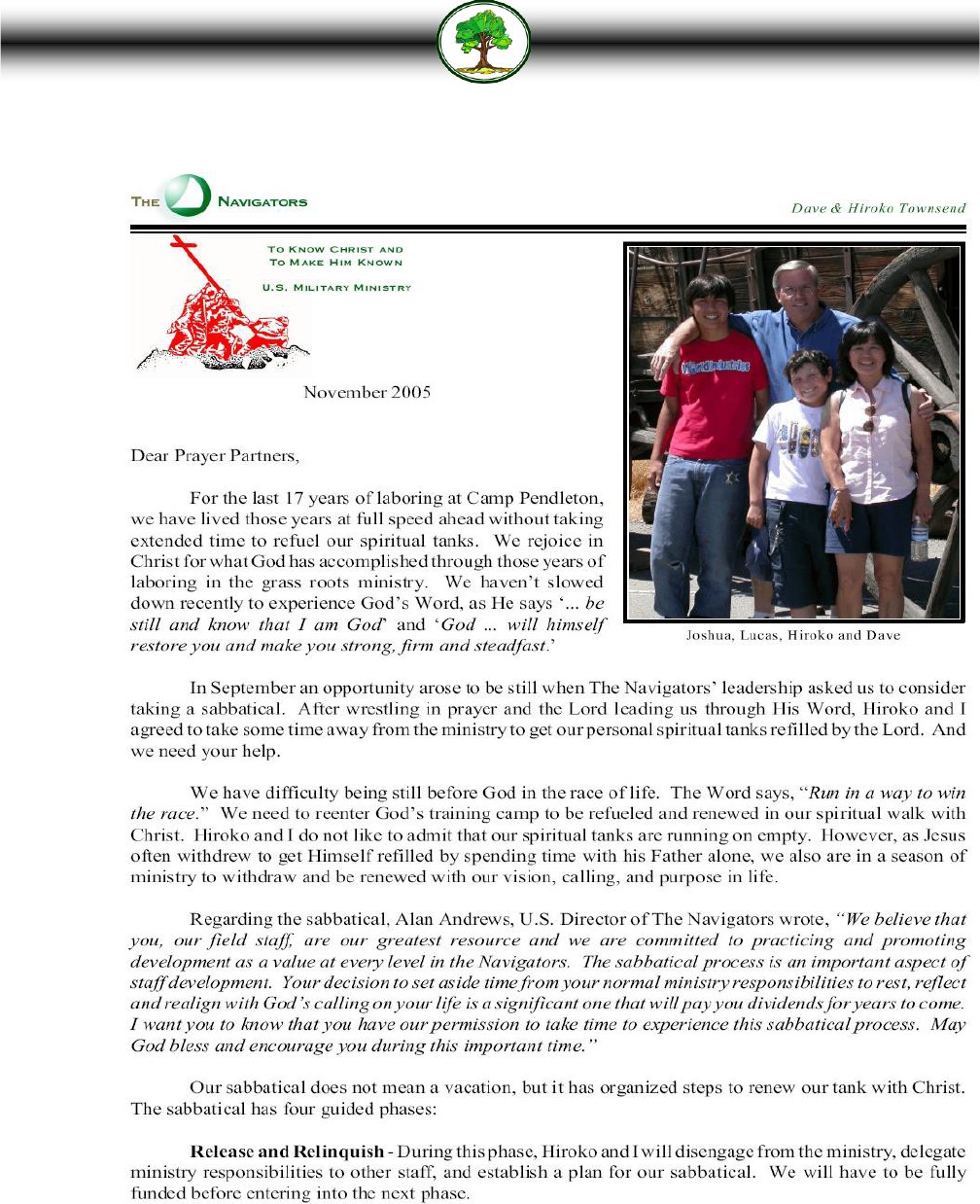
36
Sample Fundraising Letters
Sabbatical
Guidelines
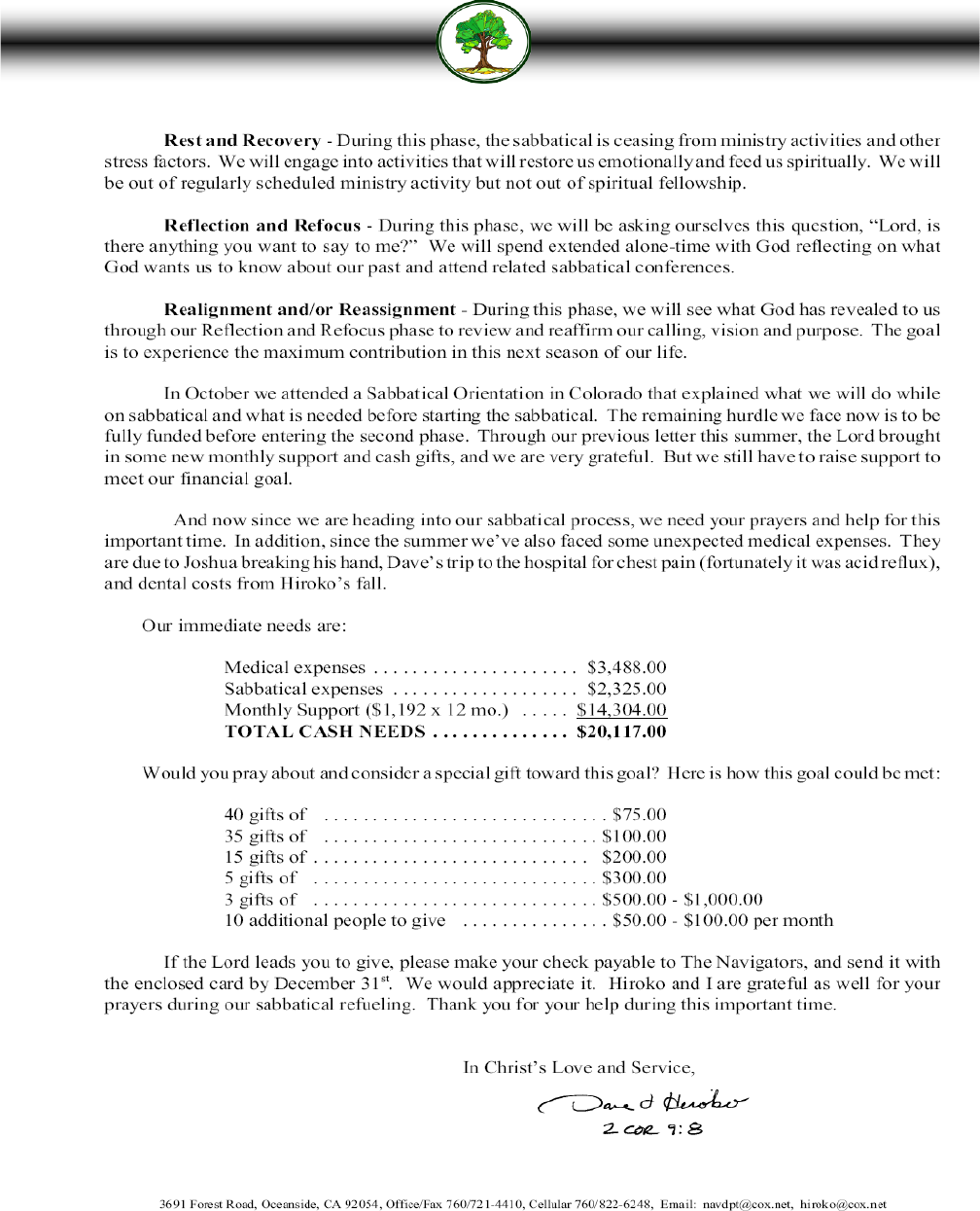
37
Sabbatical
Guidelines
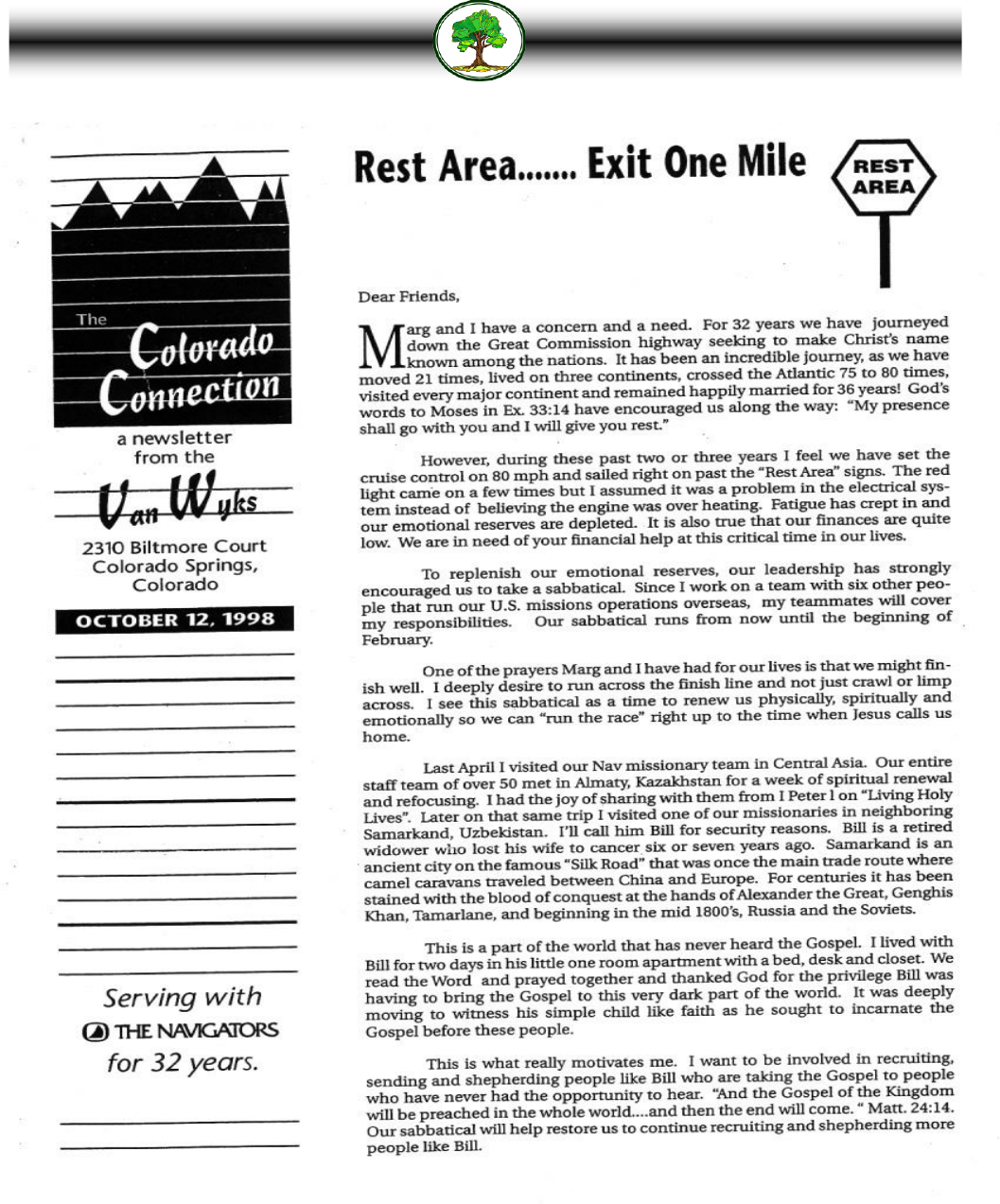
38
Sabbatical
Guidelines
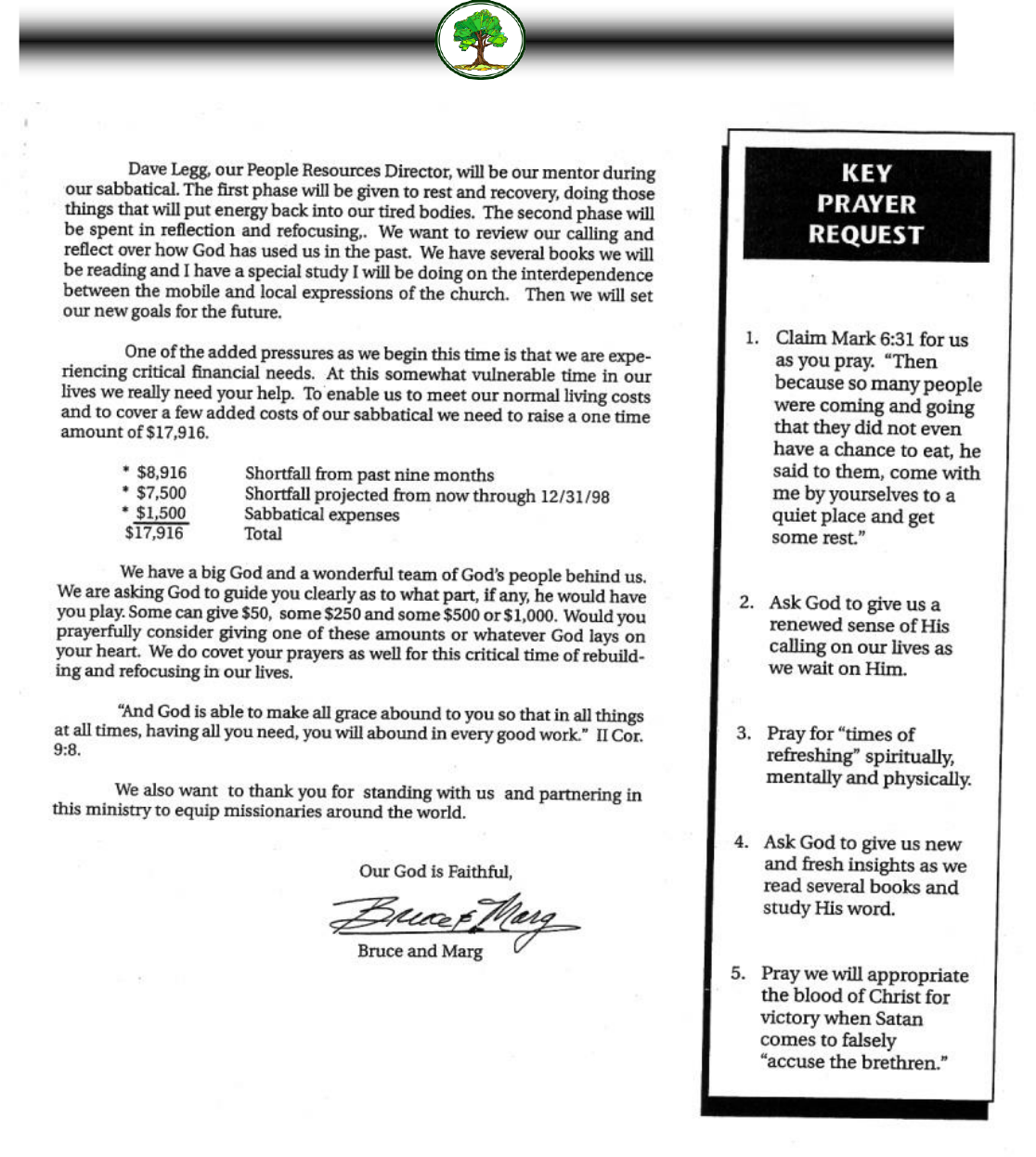
39
Sabbatical
Guidelines
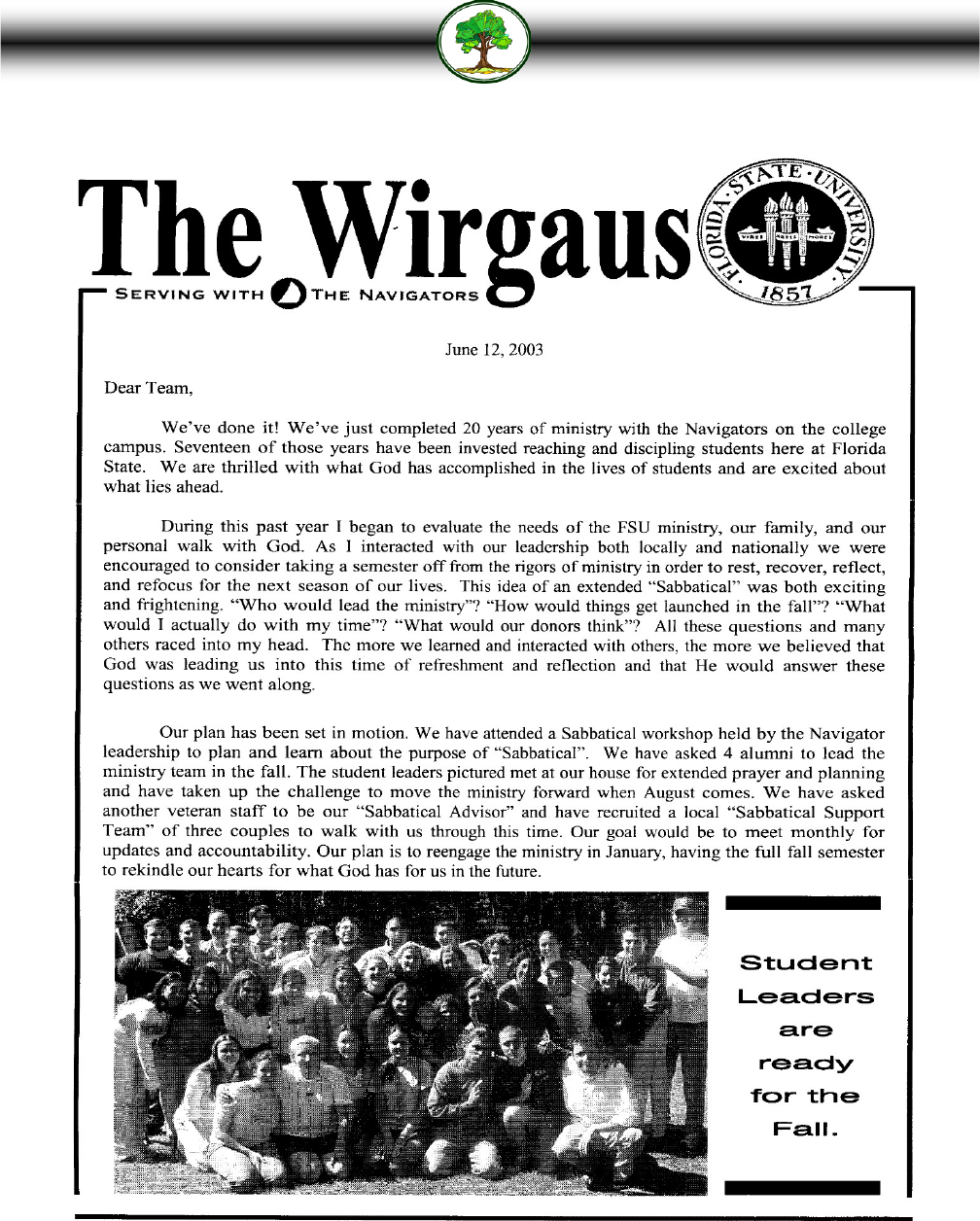
40
[Great 3-page letter informing of their sabbatical!]
Sabbatical
Guidelines
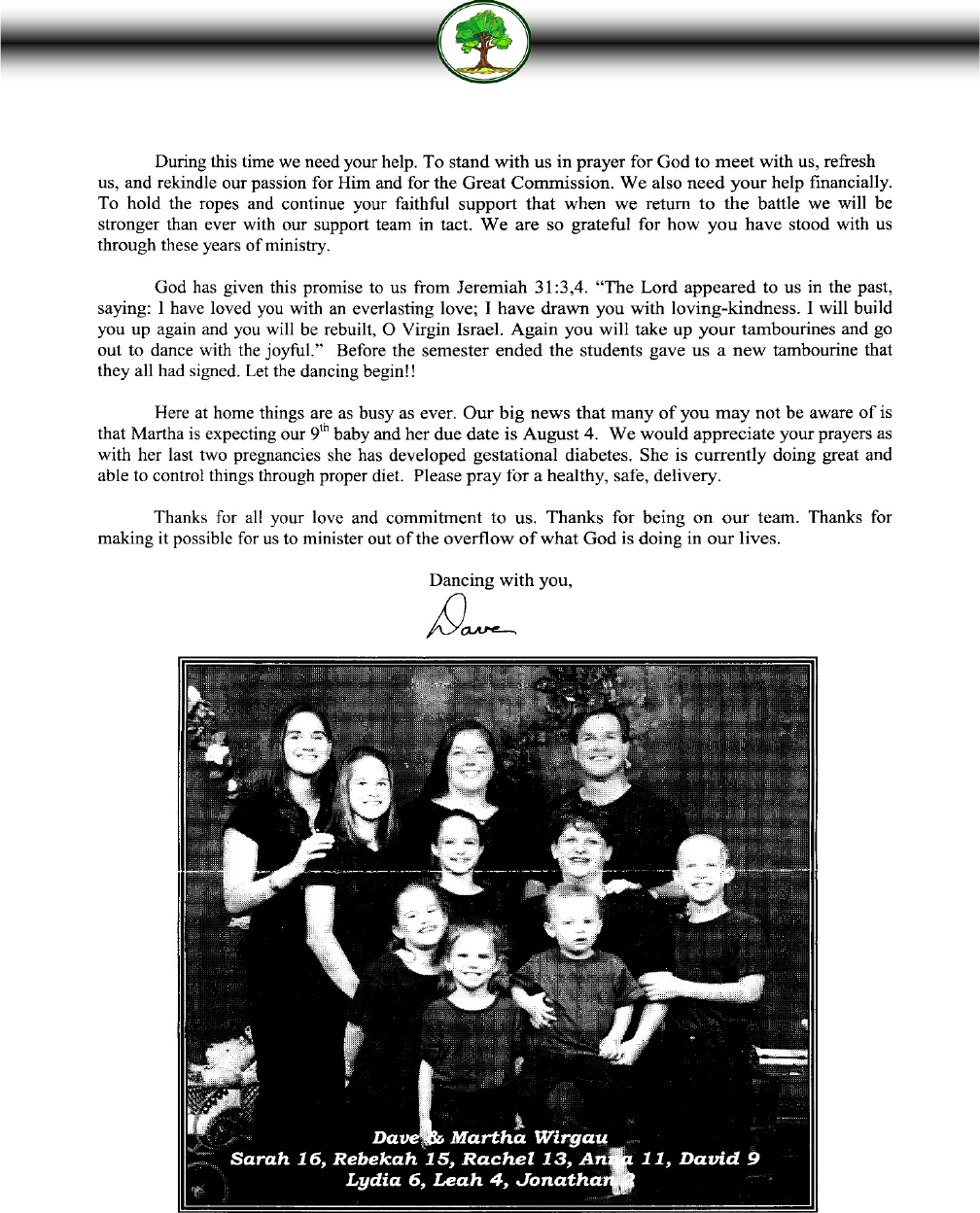
41
Sabbatical
Guidelines
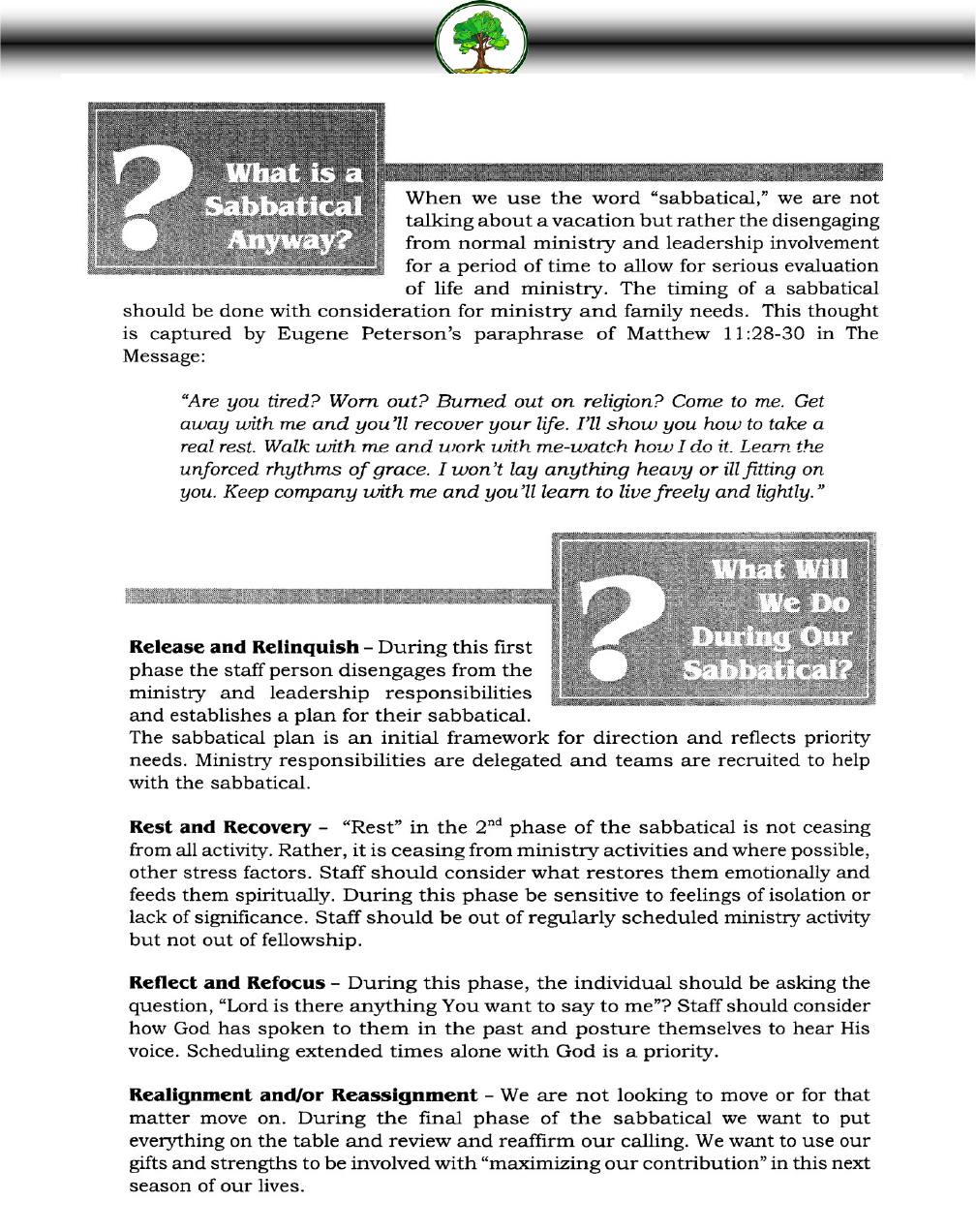
42
Sabbatical Guidelines
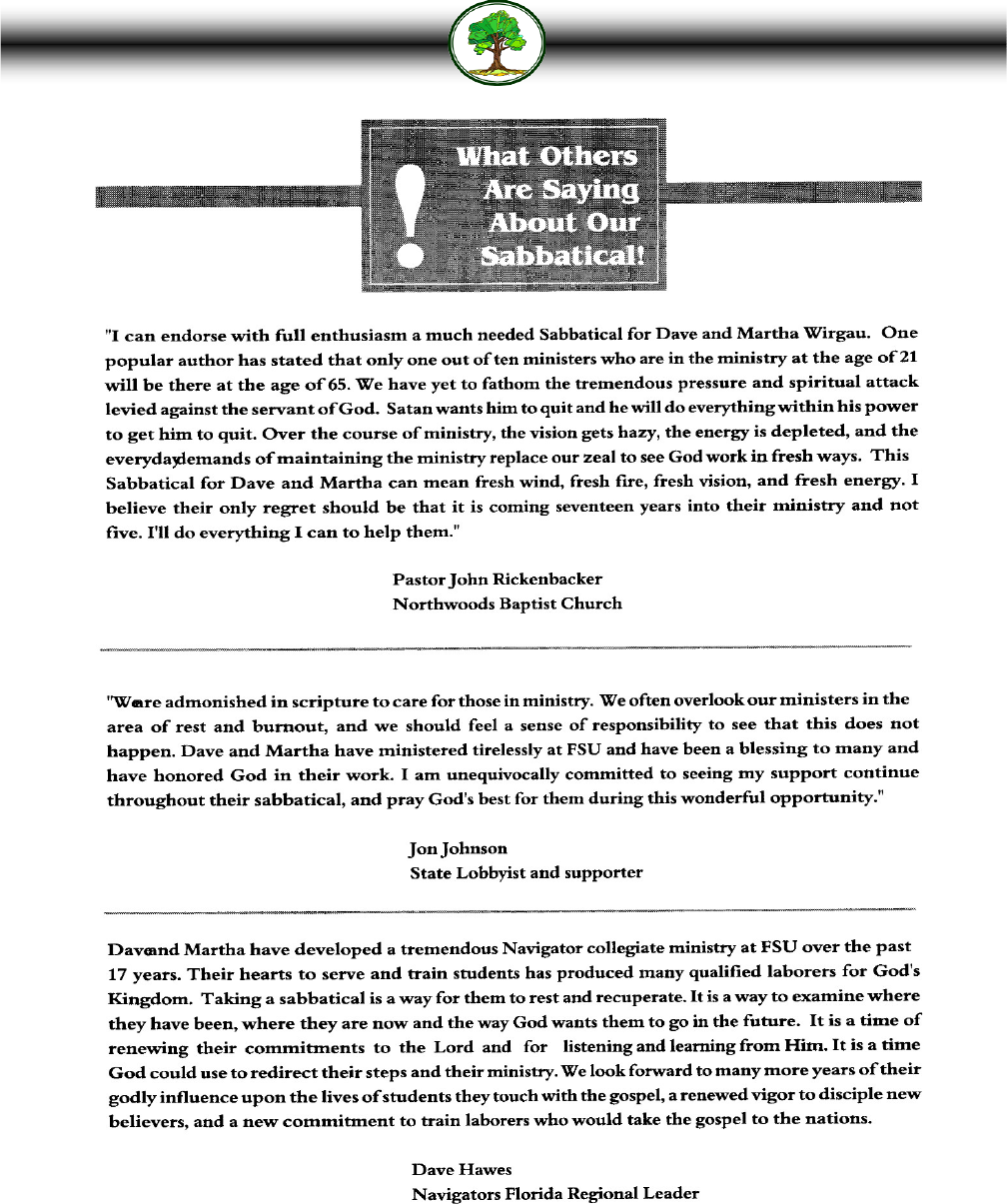
43
Sabbatical
Guidelines
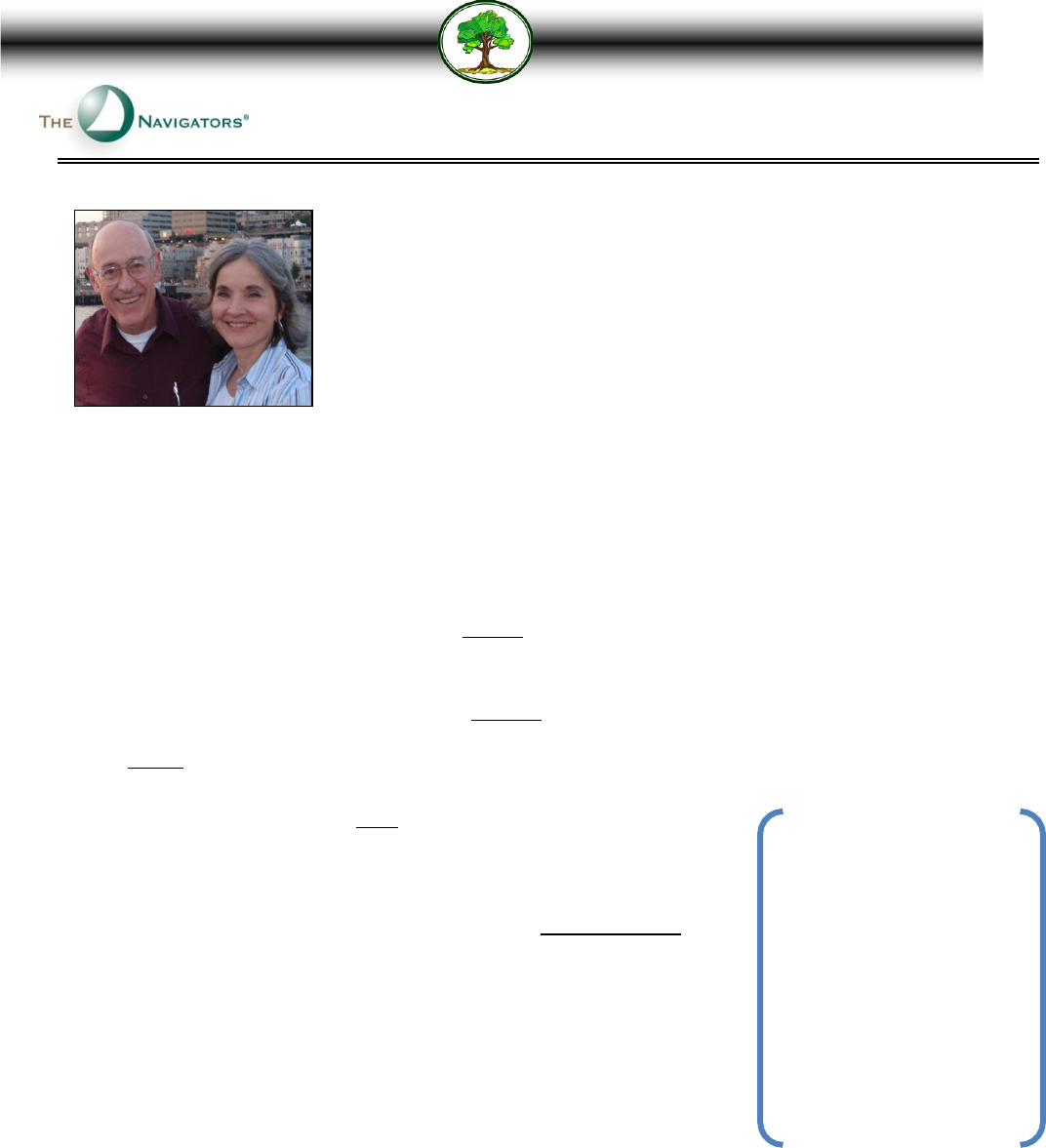
44
Dear Friends and Family, January 12, 2011
Over the last year it has become apparent that Sue and I need to reassess
where the Lord wants us to invest our time. We have partnered together in ministry for
33 great years and since our return to the U.S. from Ghana (over 13 years ago) we have
been involved with pioneering a gospel movement in the Seattle area. We are thankful
to the Lord who, during this time has opened many avenues of ministry including
encouraging our adult children in their walks with Christ, mentoring young singles and
couples, reaching out to friends nearby, taking people to Africa to help in the work of
three West African countries and encouraging/shepherding local leaders. Each area has
multiplied to the point where we see a need to take time to rest, recover and hear from
the Lord to learn if there are specific areas where He wants us to focus our energy.
We are so thankful to be serving the Lord with the Navigators because we have leaders who clearly value the
worth and contribution of each “employee”. The Navigators Human Resources Team encourages staff to take a sabbatical
every seven to ten years because of the demanding nature of a highly relational “always on call” type of work. So starting
this month, January, 2011, and going to June, 2011 we will be in a guided process to help us gain the most out of this time
of rest, reflection and reorientation. Below are descriptions of four major steps we will be moving through as we seek the
Lord during our sabbatical:
Release and Relinquish – Throughout the month of January Sue and I are presently working on disengaging from our
normal ministry responsibilities by asking the Lord who He would want to take up each role and then delegating them to
others.
Rest and Recovery – We plan to spend the month of February away from the Seattle area to be free to rest and engage in
activities that will restore us physically, emotionally and spiritually. Our plan is to then come back to our home for the
month of March to reconnect with our family (our four adult children all live in the Northwest) and be available to help
David and Shawna, if needed, as their second child (Baby Boy Crompton) is due to be born on March 17
th
.
Reflect and Refocus – In the month of April our plan, Lord willing, is to spend extended
time with the Lord and one another assessing how God has led us in the past, how he
has designed us for his service and what he has to say to us concerning the future. We
long to finish well, in step with the Lord’s desires.
Realignment and/or Reassignment – Hopefully by the end of May or early June the
Lord will have helped us clarify and reaffirm our calling, vision, focus and maximum
contribution for our next season of life. Then we will take steps for reengaging in
ministry according to his direction.
During each of these phases of the Sabbatical we will meet with a small
Sabbatical group of eight people who will listen to what we are learning from the Lord
and give input into our situation as is appropriate.
Though the sabbatical is a unique privilege, we continue to depend on donor
income as we follow the Lord’s leading stepping us through the process. Thank you for
continued prayer and financial support for what God is doing in and through us over the next several months. May he
reward you richly for your part in our lives.
Tom & Sue
Tom & Sue Crompton 1126 207
th
Place SE, Bothell, WA 98012-7755 – tcromp1997@comcast.net
44
Sabbatical
Guidelines
Tom & Sue Crompton
Please pray for us for “times of
refreshing” spiritually, mentally,
emotionally and physically.
Pray that the Lord would give us
new and fresh insights into his
love and call on our lives.
Pray for protection from any
“roadblocks” that would prevent
us from learning from and
hearing what the Lord wants us
to learn.
Tom & Sue

45
Appendix D
Rest for the Weary
Renewal for women through mini-sabbatical events
By Denele Ivins
(used with permission)
My hands gripped the steering wheel as my mini-van cut through the ranch-strewn countryside of eastern
Oregon. I was escaping to a retreat center for missionaries, in desperate need of rest and restoration. It had
been nine months since we packed up our lives in East Asia and returned to the U.S. After 18 years of Asian
life, our move back to the States was not a return “home,” but was a painful uprooting of what God had planted
deeply in the land where we raised our children and made disciples.
As I drove, rest and restoration seemed unlikely. All I could think of was what I’d left behind—my undone to-do
list and loose ends for my family in my absence. My mind raced with doubts and guilt: “I don’t really need to do
this,” “What kind of mother leaves her family for a week with an empty refrigerator?” and “I should have brought
my family along; they need it too.”
But as the miles passed, the almost-empty roads, the rural landscape and the quietness began to work magic.
My hands began to loosen their tense grip on the steering wheel. I already felt calmer—and hope was building
in me that God might use this time away to restore me.
Five days later, I retraced my journey on those rural roads. With the windows down and the radio off, my mind
was still busy, but with thoughts of a different type. As I thought of my husband and children and their needs
through our recent East-to-West transition, I was able to pray for them in a deeper, more trusting way than I
had for a long time. My heart for ministry, which had been numb for a stretch of time, was waking up. I
dreamed about the possibility of taking a group from our church back to our adopted land on a short-term
missions trip. I broke the nine-month musical silence when I sang praise songs in the privacy of my van. All at
once, as I maneuvered curving mountain roads, I realized that I was refreshed. Creativity and energy and
praise were returning—and hope had been restored.
THE ROAD TO RECOVERY
My five days at a missionary retreat center was just what I needed. But how did I even know that I needed to
get away? The truth is, that I was weary to my core and unable to take any action to help myself. Caring
brothers and sisters saw my condition and made a diagnosis: emotional exhaustion and possible burnout
because of the trauma of our transition back to life in the U.S. Beyond a diagnosis, God was gracious to give
them a prescription—a care plan to restore me back to emotional health.
Through debriefing with our church and the Navigators, I began to understand how very tired I was. I left China
tired, and then, as mom’s do, I set aside my need for rest to attend to the huge task of settling my children—
grades 6, 8 and 12—into their new lives in their passport country. Our sending organization very gently but
persistently suggested the value of taking a sabbatical after 18 years of serving overseas. My husband was
able to take a manner of one, but I found myself unable to even sit and read anything for more than five
minutes. The needs around me—carpooling, phone calls, dusty floors, and dirty dishes—seemed to scream at
me throughout my waking hours.
Across the table over lunch that week in Colorado, missionary care counselor Shirley Wilson asked me about
taking a sabbatical. My question, in a choked voice, was how could I even entertain the idea of a sabbatical—a
release from regular responsibilities to refresh and renew and learn—when I faced the task of guiding my
children through their transition, not to mention the relentlessness of the tasks of daily life. I can’t just take off
three months from life, I said.
Shirley saw my sense of drowning in my eyes—and she threw me a lifeline. “Why don’t you take mini-
sabbaticals?” she asked, coining a new phrase right then—mini-sabbatical events. With some well-placed
questions, Shirley guided me to discover what would best refresh me. My deepest longing, she helped me see,
was to get away by myself, in places with heavy doses of mountains and pine trees and quietness, where I
could rest, explore, hike, bike, read and pray.
Sabbatical
Guidelines

46
REST FOR MY SOUL
My first foray into solitude came seven weeks later. I left our home in Boise, Idaho, and drove two hours to a
little inn on the Billingsley Creek just before it pours into the Snake River. I wanted to quiet myself enough to
hear God’s voice. I took my Bible down to the creek-side swinging bench. My weariness was so deep that all I
could do was open it up to the Psalms. I remember how I read a few verses, only to have my eyes blur over
with tears. During my three days there, I did my part by showing up on that swing with God’s word in my lap,
asking Him to restore me. And He did One of the greatest burdens I carried with me on that first retreat was
the deep disappointment for my daughter Claire and her college admissions process that year. I was able to
walk away from that three-day retreat with thankfulness for the scholarships to the local university—and feel a
huge burden lifted.
A MIRROR FOR REFLECTION
On my Oregon “mini-sabbatical event,” God revealed to me a root reason for my weariness. I’d been putting
the blame solely on the transition of the past months, but He gently reminded me that my weariness came
mainly from the accumulation of the sacrifices of 18 years of living and reaching out cross-culturally.
One day I sat in the sunshine on my private deck, meditating on Psalm 20:1-3:
May the Lord answer you when you are in distress;
May the name of the God of Jacob protect you.
May He send you help from the sanctuary
And grant you support from Zion.
May He remember all your sacrifices
And accept your burnt offerings.
I began by asking God to do this for me, to answer my distress, protect me, and send me help and support. As
I took the time to reflect and let His spirit work through His word, I could see how He had been doing this all
along He remembered my sacrifices even before I did—and I began recounting in my journal a long list of
ways He had answered, protected, helped and supported me.
NURTURE FROM NATURE
Significant as these spiritual moments were for me, it would be dishonest to make it sound like I spent entire
days in monk-like meditation. In truth, these deeper moments punctuated days full of walks, bike rides, hikes,
meals out and a good novel.
On my first trip, my walks were leisurely—mostly on the way to the small-town diner where I ate comfort food
three times a day. But the springtime greenness and brilliant blue skies helped me rediscover both the beauty
of my home state Idaho and the value of quietness. I cruised my van slowly down the country roads, marveling
at the landscape carved out by the Snake River. On one drive down in the canyon, a bird burst into song just
as I drove past; the beauty of it and a sense of God’s love brought tears to my eyes.
This was physical restoration, after almost two decades of urban life—where instead of mountains, construction
cranes rose above the horizon at every turn, and instead of the serenade of songbirds, the blare of taxi horns
and yells of teaming life were what constantly assaulted my senses.
The healing power of nature was just as important in my second and third retreats, but I felt more energetic and
was able to be much more active, enjoying long hikes and bike rides.
RESOLVED TO REST
While I couldn’t manage a lengthy sabbatical, Shirley’s prescription for personal retreats—my mini-sabbatical
events—were just what I needed to renew my body, mind, and soul after the years’ sacrifices of service and the
transitions of the last year.
As I climbed into the small backcountry plane to leave my last retreat—feeling energetic, rested and hopeful—I
resolved not to wait until my weariness calls for emergency measures. I am determined to make this a life-long
habit—to take time out to seek solitude, rest and renewal. To come to Him and let Him give me rest.
“Come to me, all you who are weary and burdened, and I will give you rest….
You will find rest for your souls.” Matt. 11:28, 29
Sabbatical
Guidelines

47
Sidebar to “Rest for the Weary”
1.
Admit your need for rest. There’s no shame in being tired because you’re serving others.
You’re only human.
2.
Put it on the calendar. Once you determine your need for a rest, get a date on the calendar
before it fills up. Stick to it Resist the inevitable temptation to cancel as the time draws near.
3.
Get the support of your family and friends. Share with your husband why you’d like to try a
personal retreat; after all, he’s the one who’ll hold down the fort when you’re gone. Ask your
close friends to pray for you through the process.
4.
Resist taking someone else. A personal retreat is a great idea, so everyone who hears your
plans will want to come along. For maximum renewal, keep it solo. Encourage them to take their
own personal retreat.
5.
Don’t feel guilty. While it’s true that you’re leaving behind needs and tasks, the unselfish thing is
to make renewal a priority. You’ll return strengthened for the tasks at hand.
6.
Customize your retreat. Think through what’s restful for you. Rustic or luxurious? Active or
quiet? Mountains or ocean? Near or far?
7.
Include the nature element. The heavens do declare His glory, and are the perfect setting in
which to be renewed.
8.
Take advantage of resources. Check with your ministry organization for retreat venues in your
area designed especially for ministry workers. These are usually low-cost and sometimes offer
counseling and other resources.
9.
Think creatively. Consider off-season church camps, a friend’s mountain cabin, or an
inexpensive motel in a place you’d like to visit.
10.
Address the whole person. Include elements of rest and renewal for your body, mind and soul.
11.
Take a well-stocked tool chest. Be prepared. Pack your Bible, a devotional and other Christian
books, a songbook or hymnal, and your journal. (But don’t feel bad if you don’t use much of what
you bring.) For the whole person, pack a good novel for lighter reading, as well as your favorite
snacks.
12.
Have great expectations. Expect God to meet you in a special way. He specializes in giving
rest to the weary. All He asks of us is to come.
Sabbatical
Guidelines
Twelve steps to renewal: Tips for planning your own personal retreat

48
Appendix E
Sample Sabbatical Plan
(Blank worksheet available on www.TDC.Navigators.org)
Name: Joe and Jane Staff Sabbatical Advisor: Ben Johnson
Sabbatical dates: March-August Entity: Military
Phase I – Release and Relinquish (5-8 Months Before Sabbatical
Begins) Exiting from leadership and ministry responsibilities
Complete Sabbatical Care Interview.
Complete assessment inventories and develop sabbatical plan with sabbatical advisor.
Send completed Sabbatical Plan to SA, SD, and supervisor.
Communicate sabbatical to donors/mailing list and ministry.
Transfer or complete ministry/leadership responsibilities.
Establish sabbatical support group.
1. Jeff and Sue Smith
2. Peter and Joan Wilson
3. Paul and Marie Jones
Attend Sabbatical Orientation Workshop.
Complete fundraising for sabbatical.
Complete Sabbatical Information Form and email to TDC@navigators.org. (Appendix F)
Phase II – Rest And Recovery (March-April) Establishing Margin And
Managing Pace Of Life
Read: Isolation by Shelley Trebesch
Abba’s Child by Brennan Manning
The Overload Syndrome by Dick Swenson
Finish projects around house.
Play in softball league.
Go to Bed & Breakfast with Jane.
Attend Becoming One Marriage Intimacy Retreat.
Phase III – Reflect And Refocus (May-June) Experiencing God And Self
In New/Deeper Ways
Read Connecting by Larry Crabb and Reaching for the Invisible God by Philip Yancey.
Attend Bill Thrall seminar on leadership.
Take two extended prayer retreats asking God if he wants to say anything to me.
Meet with supervisors, Jim and Gary, to clarify perceived issues.
Complete Life Lessons.
Complete Personal Contribution Assessment Process.
Crystallize Personal Passions.
Develop a “Partnering Plan.”
Discuss future options with supervisor and dialogue with Ken Larson (ken.larson@navigators.org).
Sabbatical
Guidelines

49
Clarify my calling.
Confirm God’s direction for realignment in current role.
Get counsel from supervisors, Jim and Gary.
Engage with Ken Larson (ken.la[email protected]rg), if planning to change missions.
Complete Sabbatical Debriefing Questions and send to supervisors, SA, and SD.
Phase V – Re-Entry/Re-Engagement (September-October) Engaging at
right pace
Determine right pace to re-engage.
Communicate to supervisor and team my desires and expectations for re-entry.
Agreements
1. Keep my sabbatical a priority focus.
2. Regular journaling.
3. Bi-monthly day alone with God.
4. Jane will participate as appropriate.
5. Take initiative to stay current with sabbatical advisor and supervisors.
6. Limit ministry activities and travel as agreed with sabbatical advisor.
7. Be transparent and vulnerable.
8. Consider becoming a sabbatical advisor for another in the future.
Communication/Accountability – take initiative for
1. Bi-monthly meetings/phone calls with sabbatical advisor.
2. Monthly meeting with sabbatical support team.
3. Once per phase update supervisors.
Priority Issues [Note:
Normally A List Would Not Be This Long
]
From Sabbatical Care Interview, input for others, own prayers
1. Ministry overload, over commitment, overwork
2. Perfectionism
3. Partnering in ministry
4. Disappointment
5. Self-doubt
6. Critical spirit
7. Anger
8. Fear
9. Role-fit
10. Marriage
Miscellaneous
Confirm schedule with sabbatical advisor.
Define possible role with XYZ.
Resolve conflict with .
Sabbatical
Guidelines
Phase IV – Reassignment/Realignment (July-August) Empowering For
Maximum Contribution

50
Sabbatical Plan Worksheet
__________________________________________________
NAME
• Possible Sabbatical Dates
From _________________________ to _________________________
• Possible Reasons/Objectives/Purposes/Outcomes for Sabbatical
1) __________________________________________________________________
2) __________________________________________________________________
3) __________________________________________________________________
• Possible Sabbatical Advisor
_______________________________ _______________________________
_______________________________ _______________________________
• Possible Sabbatical Support Team Members
_______________________________ _______________________________
_______________________________ _______________________________
_______________________________ _______________________________
_______________________________ _______________________________
_______________________________ _______________________________
• Suggested Communication/Accountability Plan
(Advisor) Once every 2 weeks
(Support Team) Once a month
(Supervisor) Once per Phase
(Donors) Before/Middle/After
(Ken.Larson@navigators.org) If you anticipate you are planning to change missions.
• Possible Priority Issues
• __________________________________________________________________
• __________________________________________________________________
• __________________________________________________________________
• __________________________________________________________________
• __________________________________________________________________
• __________________________________________________________________
Sabbatical
Guidelines
51
• Phase I – Release and Relinquish ( __________________________ ) DATES
1) Fill out and email the Sabbatical Information Form to TDC@navigators.org and my
supervisor.
2) Fill out and email the Supervisor Delegation Form (if applicable) to my supervisor and
3) _____________________________________________________________________
4) _____________________________________________________________________
5) _____________________________________________________________________
6) _____________________________________________________________________
• Phase II – Rest and Recovery ( ____________________________ ) DATES
1) _____________________________________________________________________
2) _____________________________________________________________________
3) _____________________________________________________________________
4) _____________________________________________________________________
5) _____________________________________________________________________
6) _____________________________________________________________________
• Phase III – Reflection and Refocus ( ____________________________ ) DATES
1) _____________________________________________________________________
2) _____________________________________________________________________
3) _____________________________________________________________________
4) _____________________________________________________________________
5) _____________________________________________________________________
6) _____________________________________________________________________
• Phase IV – Reassignment or Realignment ( ____________________________ ) DATES
1) _____________________________________________________________________
2) _____________________________________________________________________
3) _____________________________________________________________________
4) _____________________________________________________________________
5) _____________________________________________________________________
6) _____________________________________________________________________
• Phase V – Re-Entry and Re-Engagement ( ____________________________ ) DATES
1) _____________________________________________________________________
2) _____________________________________________________________________
3) _____________________________________________________________________

52
Appendix F
Sabbatical Information Form
(Staff going on Sabbatical, fill out this form during your Release/Relinquish Phase to inform your
Supervisor and our Train-Develop-Care Team (TDC) of your sabbatical dates and if you intend to change roles.)
(Please return this form to your supervisor and to TDC@Navigators.org
.)
*These can be approximate or soft dates.
Today’s date:
First Name:
Last Name:
E-mail:
Best Phone:
Current Ministry Location:
Mission/City/Network:
Current Supervisor:
Approval Date for Sabbatical from Supervisor:
Sabbatical Advisor:
Length of Sabbatical in months: (3-6 months are approved, if you need a longer
sabbatical, please send a request to TDC@Navigators.org)
Beginning of Phase 1 date (Release and Relinquish)
Sabbatical start date*/
Beginning of Phase 2 date* (Rest and Recovery):
Beginning of Phase 3 date* (Reflect and Refocus):
Beginning of Phase 4 date* (Realignment and Reassignment)
Estimated Sabbatical End Date */
Beginning of Phase 5 date* (Re-Engagement and Re-Entry):
What are your initial thoughts about returning to your role after your sabbatical?
Sabbatical
Guidelines

53
Appendix G
1.
Role Fit Inventory
Carefully read each of the ten statements below and insert the number between 1 and 5 that best
represents your response.
Strongly disagree
Disagree
Neutral
Agree
Strongly agree
1
2
3
4
5
In my current role, I’m utilizing my primary gifts and abilities.
I’m motivated and challenged in my day-to-day activities.
I draw satisfaction and fulfillment from my current contributions.
I feel energized and encouraged in my primary responsibilities.
I have a sense that I’m making a significant contribution to my organization.
The ability to fulfill my current responsibilities comes naturally and easily.
I receive feedback from others that I’m in a good role-fit.
I experience little frustration in my current role.
I don’t experience unmanageable stress in my current role.
My relationships with co-workers are generally free of conflict.
Total
INTERPRETING YOUR SCORE
40 – 50 Maximizing
15 – 39 Moderate
0 – 14 Marginal
Sabbatical
Guidelines

54
2.
Burnout Inventory
These questions may give you an idea of how heavily you’re experiencing burnout. Rate your
response to each question on a scale from 1 to 5. (1 = Doesn’t describe me at all. 5 = Describes
me very accurately.)
I’m exhausted much of the time, and rest doesn’t seem to help much.
I don’t get as much satisfaction from ministry as I used to.
Most mornings, I dread beginning my ministry responsibilities.
I feel like a failure in the ministry.
I don’t sleep as well as I used to; or I’m sleeping more than I used to.
It’s more and more difficult for me to deal with people’s problems.
I have more difficulty making decisions than I used to.
I get very frustrated when things don’t go well in the ministry.
More and more I find myself thinking about leaving The Navigators.
I feel greatly bothered or guilty about ministry responsibilities not done or not done well.
I get angry and/or irritable more easily than I used to.
I often feel a sense of emptiness and depletion, as if I have nothing more to give.
The ministry gives me very little or no joy.
I’m concerned that I won’t be able to last much longer in the ministry.
It’s getting more and more difficult to do some aspects of the ministry.
I struggle with feeling pressure to perform and succeed.
Total
Assessing Your Level of Burnout
15-29: You probably don’t have a problem with burnout.
30-49: You may be experiencing mild to moderate burnout.
50-64: You may be suffering significant burnout.
65-75: You may be in serious trouble.
Adapted from a similar Burnout Inventory prepared by Ken Williams, Ph.D., Wycliffe Bible Translators, Inc.
Sabbatical
Guidelines

55
(Each spouse should fill out a separate survey. Information will be kept confidential.)
I.
GENERAL INFORMATION
In what area or areas of difficulty would you like help?
What results you would like to see?
Optional Question – HIPAA regulations protect your privacy. If you’re comfortable, please list
any physical conditions that may impact your sabbatical.
When was the last time you had a physical?
Please indicate any conditions that apply to you:
Headaches
Insomnia
Fear
Loneliness
Indecisiveness
Racing heartbeat
Constipation
Vomiting
Abandonment
Smoking
Economic
difficulty
Weight loss
Guilt
Sexual addiction
Eating disorder
Loss of hope
Difficulty relaxing
Learning
difficulties
Tiredness
Anxiety
Panic attacks
Dizziness
Fainting
Depression
Inferiority
Nerves
Rejection
Appetite loss
Work difficulty
Weight gain
Anger
Marital difficulty
Attention deficit
Sleep too much
Strange thoughts
Problems with
pornography
Difficulties with
friendships
Abusive to spouse
High blood
pressure
Nightmares
Irritability
Loss of initiative
Drug problems
Alcohol problems
Nervousness
Stomach problems
Suicidal thoughts
Memory loss
Problems at home
Sexual control
problems
Problems with
parents
Phobias
Obsessions
Difficulty
concentrating
Abuse by spouse
Sabbatical
Guidelines
3. PERSONAL AND MARITAL SURVEY

56
Do any other physical/emotional conditions apply to you?
STRESS LEVEL
How would you evaluate your level of stress on a rating of 1-10 (10 = high stress)? Explain.
Are you struggling with attitudes such as resentment, anxiety, fear, pride, etc.?
How would you rate the level of pressure you feel to perform and succeed?
What relaxes and refreshes you?
How would you evaluate your level of restlessness?
RELATIONSHIPS
Do you have unresolved conflicts with people that need to be addressed?
Do you experience feelings of loneliness, isolation, or insecurity?
Sabbatical
Guidelines

57
PERSONAL DEVELOPMENT
What have you always wanted to do but never had the time?
In what character areas do you feel the need to grow?
In what ways are you developing your God-given gifts and design?
II.
SPIRITUAL INTIMACY
Assess your spiritual intimacy with God by assigning each aspect a number from 1 to 10 (10 =
excellent).
My intimacy with Christ is truly vibrant and growing.
The Word and Spirit of God are speaking to me and guiding my mind, decisions, and
significant relationships.
I have passages and promises from God for life and ministry that motivate me in my walk
with Him.
In my time alone with God I’m growing in thankfulness, praise, and worship.
Intercessory prayer tends to be foundational to everything I do.
I’m praying and believing God for my life, ministry, and significant relationships.
My spiritual disciplines are strong and consistent.
My motivation to live a life of devotion to Christ in purity of heart, ministering out of
interest in the welfare of others, is strong.
The joys, hardships, sufferings, and circumstances of my life are drawing me to a deeper
love for and dependence on Christ.
I have a consistent inner sense that God deeply loves me, is present within me, is for me,
and is active in my life.
Sabbatical
Guidelines

58
Is there a spiritual discipline that I sense is weak and would like to grow in?
Reflect on the above parameters of your spiritual life, as well as any others that come to
mind. Talk to God about them and ask Him to speak to you. Is He putting His finger on
some area of your spiritual life, urging you to develop in it? If so, what?
Sabbatical
Guidelines

59
III.
MARITAL INTIMACY
Independently of one another, please assess the following areas of your marriage by assigning
each aspect of intimacy a number from 1 to 10 (10 = excellent). Then enter your spouse’s
ratings and compare.
View of
Aspect of Intimacy
Husband Wife
1. Our spiritual closeness through prayer and sharing the Word together is rich.
2. Frequent times of quality communication and special times away together are
high priority.
3. We practice honest confession and genuine forgiveness when we hurt one
another.
4. My spouse is good at sharing appreciation, and at speaking and showing love.
5. My spouse and I often agree on important issues concerning values and beliefs.
6. We generally understand and appreciate each other’s differences.
7. We often share deep feelings and strong emotions like grief, sadness, and joy.
8. We give each other undivided attention when listening or talking.
9. Our communication is characterized by sharing on important and significant
issues.
10. The handling of finances isn’t usually a source of tension in our relationship
11. My spouse and I understand and accept our marital roles.
12. My spouse is responsive and sensitive to my needs and desires concerning our
relationship.
13. My spouse and I experience community and meaningful relationships with a few
close friends.
14. We’re comfortable in our relationship with our children.
15. My spouse and I take part together in recreation, relaxation, and rest.
16. We have good and meaningful relationships with our in-laws and parents.
17. We partner together in some areas of common interests, and in ways that are
consistent with individual design and desires.
18. Generally I am satisfied with our level of sexual intimacy.
Sabbatical
Guidelines

60
Assessing Your Level of Intimacy
A.
Record your responses to the questions and share with one another.
B.
Identify and talk about areas of significant agreement and disagreement.
Areas of Agreement Areas of Disagreement
As a couple, what are your three greatest strengths?
As a couple, what are your three greatest weaknesses?
Identify and agree on one or two issues as most important to focus on during your sabbatical.
Sabbatical
Guidelines

61
IV.
CAREGIVING AND COUNSELING
Is there anything else you’d like to discuss or explore?
Is there any area in which you seem unable to make progress on your own?
Have you seen counselors in the past? In what areas did you seek help? Was it helpful to you?
If so, how?
Sabbatical
Guidelines

62
OVERVIEW
The purpose of a Sabbatical Care Interview is to determine priority emotional or spiritual
issues that should be dealt with during the sabbatical. This interview should be scheduled as
early as possible – preferably during the Release and Relinquish Phase.
PROCESS
1.
The Director of Pastoral Care finds the closest, most available Pastoral care specialist
and coordinates with him or her about doing the interview.
2.
The Director of Pastoral Care has questionnaires emailed to the staff.
3.
The pastoral care specialist and staff set a time for the interview.
4.
The staff sends their questionnaire results to TDC@navigators.org.
5.
The questionnaires are emailed to the pastoral care specialist, along with a
sample Sabbatical Care Interview Feedback form.
6.
The pastoral care specialist interviews the staff and prepares feedback, giving
recommendations, identifying priority issues, and including any follow-up plan, if
necessary. He or she keeps a copy and forwards one to the staff.
7.
The staff and sabbatical advisor make sure appropriate issues and possible action
steps are included in the Sabbatical Plan.
8.
The pastoral care specialist follows up as necessary.
Sabbatical
Appendix H
Sabbatical Care Interview Process
